Share post now

global
The Alliance Sud magazine analyses and comments on Switzerland's foreign and development policies. "global" is published four times a year (in german and french) and can be subscribed to free of charge.
Interview
30.09.2025, International cooperation
Decolonization isn’t just about the past — it’s about the future of just global cooperation. We discussed this topic with Gunjan Veda, the Global Secretary of the Movement for Community-led Development and an expert on decolonizing aid. She shares her vision of the future role of NGOs and speaks about the art of listening. Interview by Laura Ebneter.
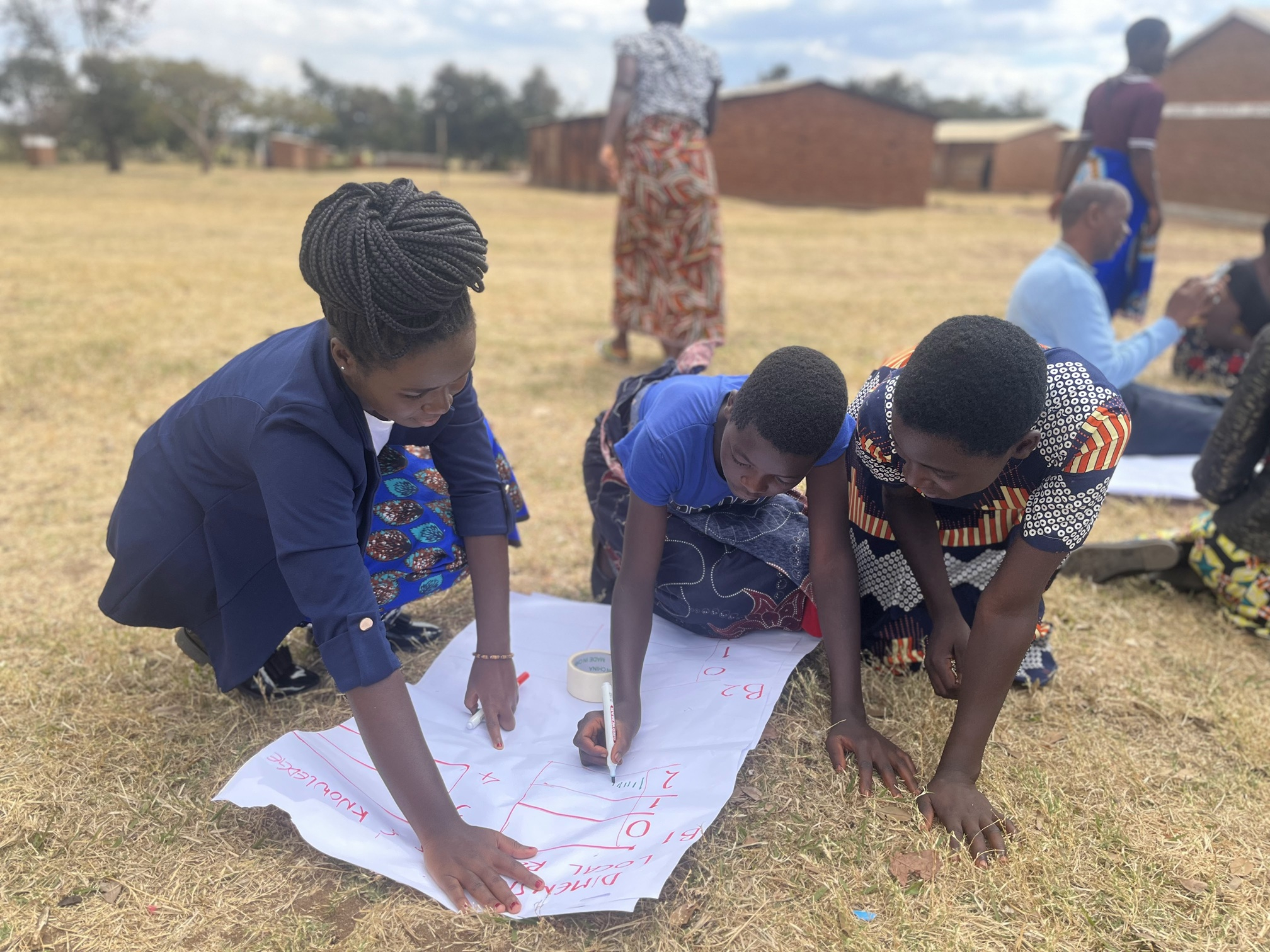
In the Kasangadzi Area Programme in Dowa, Malawi, participants use a participatory tool for community-led development. © Gunjan Veda / MCLD
You are an expert on the decolonization of development cooperation. What personal experiences shaped your view of development cooperation?
I began my career as a grassroots activist in India and worked for the non-profit and government sector there for almost 20 years before moving to Canada and the US. And what a change it was! When I started engaging with bodies like USAID, my first impression was: I thought I knew English. But I clearly did not because the language in the sector is so full of jargon. There are very few spaces where we are able to translate and hear each other’s perspectives and begin to understand each other. Therefore, coming to this part of the world and engaging in these conversations has been both frustrating and illuminating. It has enabled me to understand the myriad perspectives of very diverse stakeholders.
When you talk about the “Minority World” and the “Majority World”, how do you understand these concepts?
Historically, we have used a lot of words to describe countries in what we call the Majority World – Africa, Latin America, Caribbean, Asia – from least developed, Third World, resource-poor countries to now the Global South. Each of these terminologies not only has a strong power dynamic embedded in it, they are inaccurate. They portray the Majority World as less than the Minority World, as if they are inadequate and need to catch up.
Where does the term come from?
The term Majority World was coined by Bangladeshi activist and photographer Shahidul Alam in the early 1990s. He used the term to challenge the Minority World: if you truly value democracy, how can it be that a small fraction of the globe continues to make decisions for the vast majority? Personally, I adopted the term for one more reason: it’s a reminder to us, in the Majority World, that we are the majority of the world’s population and we have the agency to transform it; we are not powerless.
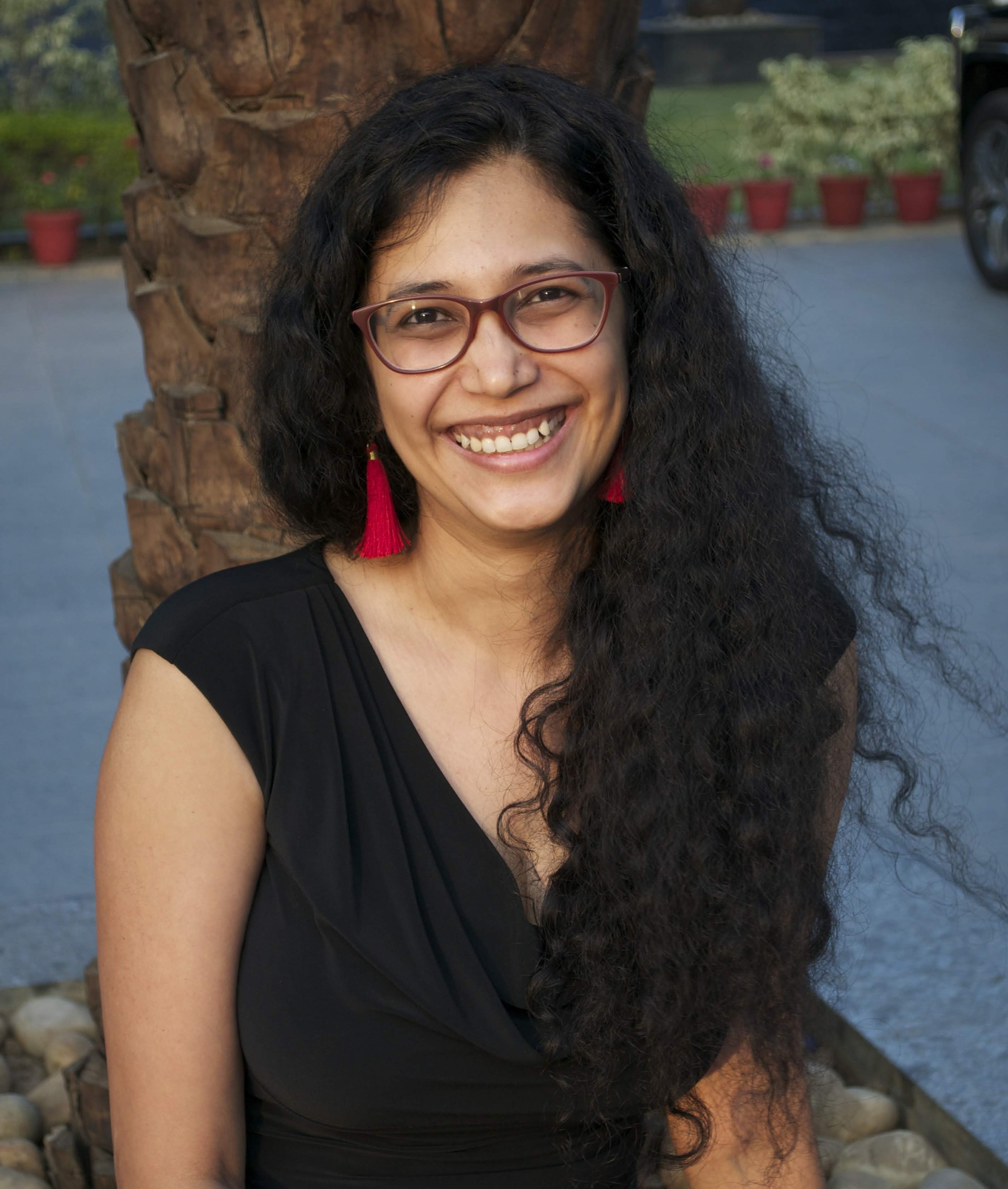
Gunjan Veda is the Global Secretary of the Movement for Community-led Development, a Majority World-led network of 3000+ local, community-based organizations and their INGO allies. A public policy strategist, human rights advocate, and writer, she is an active participant in the decolonizing aid and #ShiftThePower conversations. Gunjan Veda has worked extensively with organizations like USAID and the World Bank to center community voices in international development. Routledge has just published her third book: Community-led Development in Practice: We power our own change. Gunjan Veda has previously worked within the non-profit and government sectors in India, and was a policy-maker in the Indian Government’s Planning Commission.
The funding structures and ways of working of the development and humanitarian sectors exacerbated this feeling of powerlessness.
You are a vocal advocate of the #ShiftThePower movement. Has the power already shifted towards local communities and organizations?
The Movement for Community-led Development was launched in 2015, and we were one of the early adopters of the term #ShiftThePower when it was coined in 2016. At that time, it was a radical concept because it recognized the power imbalances reinforced by our sector. But now we have moved on from the term. Because “shifting the power” implies that someone (the Minority World or the funders) has power in the system and they need to give it to us – communities, and organizations in the Majority World. However, we in the Majority World do have power. We have always had power. Colonialism sought to erase our power and imbued in us a sense of powerlessness and dependency. The funding structures and ways of working of the development and humanitarian sectors exacerbated this feeling of powerlessness. As the conversation on the decolonization of aid has gradually picked up in the last few years, people are beginning to realize this. But the idea is still not mainstream.
What is holding us back?
I truly believe that most people come into development cooperation with good intentions, not to push forward a colonial legacy. We work in this sector because we genuinely believe in human rights and want to make a difference. However, the institutions of international development, be they government agencies, philanthropists or NGOs, were not designed to create an equitable, just world. They were designed as instruments of control and “soft power”. And by falling into the ways of this sector, development practitioners inadvertently promote and strengthen the very power imbalances they seek to address. So, people: good intentions. System: reinforcing dependency and continuing the colonial legacy. And that is what is holding us back.
We need to recognize that we are not all just protagonists or side actors. Whatever role we play in the ecosystem is equally important and there is space for all of us. But, we need to radically rethink our roles based on our strengths.
So, how can we shift the power or, in your words, address the coloniality embedded in our system?
Addressing the inherent coloniality in our system requires us to rethink our roles. We need to recognize that we are not all just protagonists or side actors. Whatever role we play in the ecosystem is equally important and there is space for all of us. The discussion on localization has created a huge fear, where INGOs worry that they and their knowledge may not be relevant anymore. But it is not that. Your knowledge is important in some part of the work and the knowledge of local actors is relevant in other parts of the work. So, we need to radically rethink our roles based on our strengths. We need to move away from the current competitive mindset to a collaborative one. And we need to make a very conscious decision to listen to each other. Although it seems so easy to do, that’s the most difficult thing. We have lost the art of listening.
How could we better listen and therefore better understand each other?
Listening requires a fundamental shift in our mindset. We need to believe that people who don’t look like us, sound like us, speak our language, people who do not have access to elite institutions and fancy degrees and who may never have travelled outside their part of the world, possess knowledge, experience and wisdom. Their worldview matters, their ideas matter, their values matter. We need to address language barriers, get curious, ask questions. Listening requires humility and a willingness to learn.
Would listening be the key to fixing the system and eliminating the current power imbalances in development cooperation?
Let’s be clear, the system cannot be fixed. Development cooperation was created as a system of control and power to keep former colonies geopolitically and economically close. The whole locally led conversation is about making an unjust system a little less unjust. The current system was never designed with nor for Majority World communities. It was designed to keep out communities, to keep out local organizations, to keep out Majority worldviews.
I am not saying Official Development Assistance or ODA needs to be abolished. That would be a disaster – there are millions of people around the world who do not have access to even basic services and human rights because of continuous exploitation. But we need to think of ODA not as assistance or charity but as reparations to right historic and ongoing wrongs. And we need to gradually pave the way towards a post-ODA world that is just and equitable. For this to work, however, the global financial and economic system must be restructured. A just approach to debt and taxation is urgently needed. This would enable the Majority World governments to better provide for their people, without depending on external aid that comes with many strings attached.
The global financial and economic system must be restructured. A just approach to debt and taxation is urgently needed.
Which roles do you see for INGOs in this post-ODA world?
Minority World organizations have the power to influence the people and policies of the countries they are based in. Influencing public opinion is so important because the public does not understand global solidarity anymore. This makes it very easy for anti-rights groups to dominate the narrative.
And there are contexts where Minority World actors can do things which Majority World actors cannot. For example, if you are a LGBTQI+ activist in Uganda and you are being persecuted in your country, it may be more difficult to speak up. INGOs can use their reach to amplify the voices of local actors or shine a spotlight on atrocities and innovations alike. There are definitely roles for INGOs, but they will be very different from the ones they are used to. And to be clear, neither international nor local organizations should continuously be doing service delivery.
But they are key for poverty reduction, why should civil society not engage in those areas?
I think this has been a huge part of the problem in our sector. Health, education, water, electricity, roads, these are basic human rights, guaranteed by constitutions and governments. It is the mandate of elected governments to provide their population with these services, not NGOs. Besides the need for these services is only going to increase. So, if civil society continues to do service delivery, we are going to need an ever-increasing budget to do so and a very different set of expertise. The role of civil society is not service delivery; it is to enable governments to provide services to their people and to ensure people are able to hold their governments accountable, and that people are aware of their rights and work with their governments to realize them.
The global financial architecture and the rules of taxation enable multinationals to exploit the resources of Majority World countries without paying taxes or compensating the communities to whom those resources belong.
What about contexts, where service provision is not fulfilled by the State?
History has shown us that the most brutal and authoritarian regimes get overthrown if they completely stop listening to the people. There are revolutions happening for that reason. If the government is not able to provide basic services, people will stand up against those regimes. If you see your family members starving, you have nothing to lose so you will rise up and protest. Service provision by outsiders is never a sustainable solution. It may help in the interim, and is definitely required in cases like humanitarian disasters and conflicts, but civil society will eventually run out of resources. And frankly we have neither the skill nor the mandate, resources or infrastructure to keep doing this.
At the same time, it’s important to remember that many Majority World governments are not in a position today to provide basic services to their people, because the taxes they collect and their resources go into debt servicing. The global financial architecture and the rules of taxation enable multinationals to exploit the resources of Majority World countries without paying taxes or compensating the communities to whom those resources belong. This needs to change and that requires strong advocacy by civil society, particularly by INGOs as it is often Minority World governments that are upholding this exploitative financial architecture.
Tax evasion schemes or cutting ODA is, at this point, directly signing the death warrant for many communities around the world.
Bearing in mind the role of Switzerland, for example, in the extractive industries, what call for action do you have for the Swiss government?
Switzerland and Swiss people have long prided themselves on being the upholders of humanitarian law and human rights values. If you are serious about these values, you have to stop upholding the systems that attack those values. Tax evasion schemes or cutting ODA is, at this point, directly signing the death warrant for many communities around the world. ODA doesn’t have to stay, it shouldn’t stay. But how it is phased out needs to be a decision made collectively with the people who are directly affected by the change. We are living in an interconnected world, so we cannot afford to think only of “our people” first. If you want to put the safety of Swiss citizens first, you’d do better to tackle the bigger and broader issues.
What call do you have for Swiss civil society?
Currently, the anti-rights forces are coming together to root out the rights and the freedoms we have been fighting to uphold. And we are so busy in our silos trying to dot the i’s and cross the t’s first, that we fail to come together and address this threat. We have to get out of our boxes – these majority and minority, INGO, local, social movement, or organized civil society divides – and come together. We have to go back to the actor that is most powerful in this system, and that is the everyday citizens. We have to start listening and we have to start engaging with them if we want to uphold human rights.
Share post now

global
The Alliance Sud magazine analyses and comments on Switzerland's foreign and development policies. "global" is published four times a year (in german and french) and can be subscribed to free of charge.
Gaza: Joint appeal by international NGOs
14.08.2025, International cooperation
Alliance Sud and over 100 other organizations call for an end to Israel’s weaponization of aid.
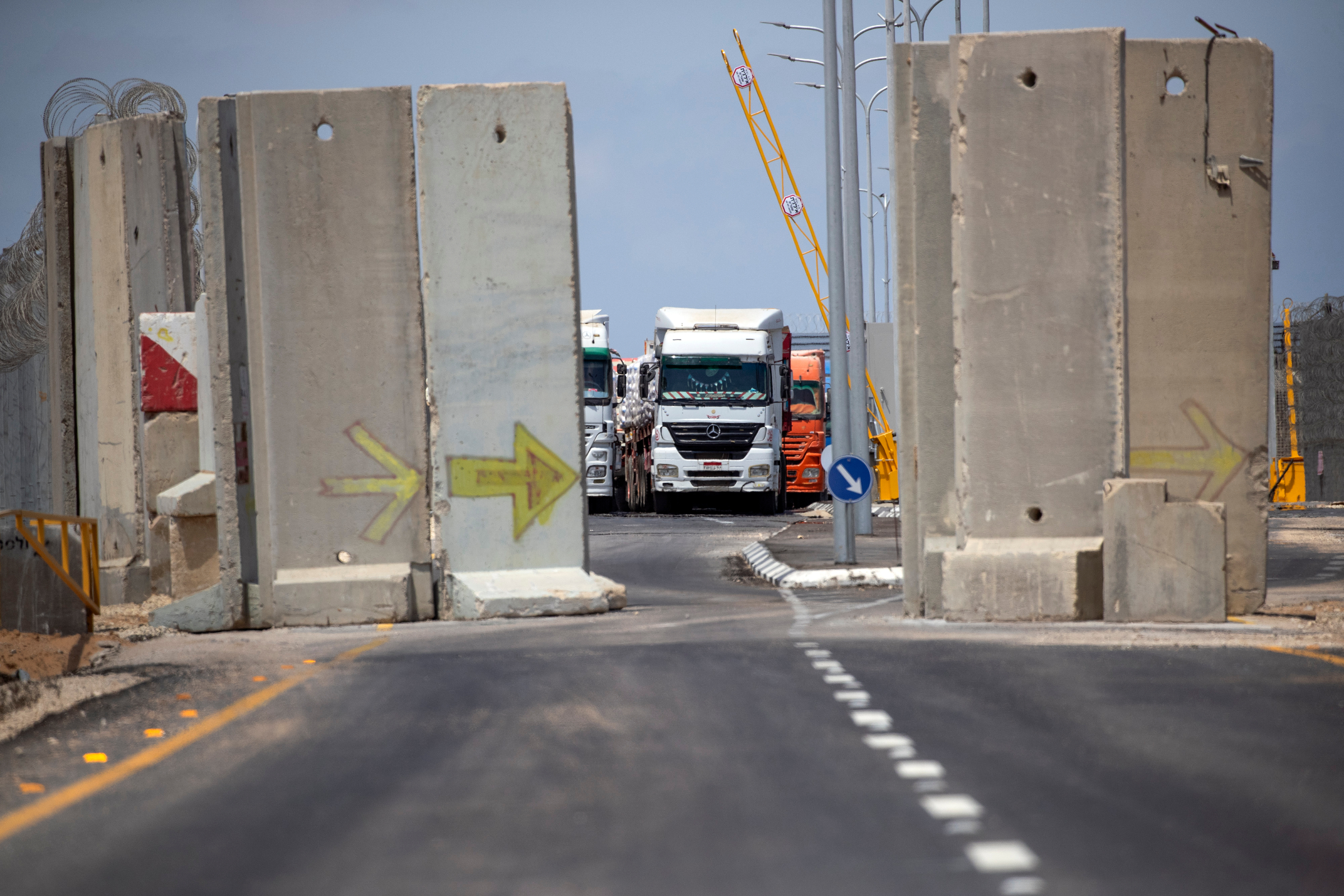
On the wrong side of the wall: Trucks loaded with aid supplies wait for authorization at the border crossing between Egypt and Gaza. © Keystone / Jim Hollander
Joint appeal by over 100 international NGOs. The complete list can be found at the end of the text.
Despite claims by Israeli authorities that there is no limit on humanitarian aid entering Gaza, most major international NGOs have been unable to deliver a single truck of lifesaving supplies since 2 March.
Instead of clearing the growing backlog of goods, Israeli authorities have rejected requests from dozens of NGOs to bring in lifesaving goods, citing that these organizations are “not authorized to deliver aid.” In July alone, over 60 requests were denied under this justification.
This obstruction has left millions of dollars’ worth of food, medicine, water, and shelter items stranded in warehouses across Jordan and Egypt, while Palestinians are being starved.
“Anera has over $7 million worth of lifesaving supplies ready to enter Gaza – including 744 tons of rice, enough for six million meals, blocked in Ashdod just kilometers away,” said Sean Carroll, President and CEO of Anera.
Many of the NGOs now told they are not “authorized” to deliver aid have worked in Gaza for decades, are trusted by communities and experienced in delivering aid safely. Their exclusion has left hospitals without basic supplies, children, people with disabilities, and older people dying from hunger and preventable illnesses, and aid workers themselves going to work hungry.
The obstruction is tied to new INGO registration rules introduced in March. Under these new rules, registration can be denied on the basis of vague and politicized criteria, such as alleged “delegitimization” of the state of Israel. INGOs warned the process was designed to control independent organizations, silence advocacy, and censor humanitarian reporting. This new bureaucratic obstruction is inconsistent with established international law as it entrenches Israel’s control and annexation of the occupied Palestinian territory.
Unless INGOs submit to the full registration requirements, including the mandatory submission of details of private donors, complete Palestinian staff lists and other sensitive information about personnel for so-called “security” vetting to Israeli authorities, many could be forced to halt operations in Gaza and the West Bank, including East Jerusalem, and remove all international staff within 60 days. Some organizations have even been issued a seven-day ultimatum to provide Palestinian staff lists.
NGOs have made clear that sharing such data is unlawful (including under relevant data protection laws), unsafe, and incompatible with humanitarian principles. In the deadliest context for aid workers worldwide, where 98 percent of those humanitarians killed were Palestinian, NGOs have no guarantees that handing over such information would not put staff at further risk, or be used to advance the government of Israel's stated military and political aims.
Today, INGOs’ fears have proven true: the registration system is now being used to further block aid and deny food and medicine in the midst of the worst-case scenario of famine.
“Since the full siege was imposed on 2 March, CARE has not been able to deliver any of our $1.5 million worth of pre-positioned supplies into Gaza,” said Jolien Veldwijk, Country Director of CARE. “This includes critical shipments of food parcels, medical supplies, hygiene kits, dignity kits, and maternal and infant care items. Our mandate is to save lives, but due to the registration restrictions civilians are being left without the food, medicine, and protection they urgently need.”
“Oxfam has over $2.5 million worth of goods that have been rejected from entering Gaza by Israel, especially WASH and hygiene items as well as food,” said Bushra Khalidi, Oxfam Policy Lead. “This registration process signals to INGOs that their ability to operate may come at the cost of their independence and ability to speak out.”
These restrictions are part of a broader strategy that includes the so-called “GHF” scheme – a militarized distribution mechanism promoted as a humanitarian solution. In reality, it is a deadly tool of control, with at least 859 Palestinians killed around “GHF” sites since it began operating.
“The militarized food distribution scheme has weaponized starvation and curated suffering. Distributions at GHF sites have resulted in extreme levels of violence and killings, primarily of young Palestinian men, but also of women and children, who have gone to the sites in the hope of receiving food,” according to Aitor Zabalgogeazkoa, MSF emergency coordinator in Gaza.
Both the “GHF” scheme and the INGO registration process aim to block impartial aid, exclude Palestinian actors, and replace trusted humanitarian organizations with mechanisms that serve political and military objectives. They come as the government of Israel to escalate its military offensive and deepen its occupation in Gaza, making clear these measures are part of a broader strategy to entrench control and erase Palestinian presence.
“At this point, everyone knows what the correct, humane answer is, and it's not a floating pier, airdrops or the “GHF.” The answer, to save lives, save humanity and save yourselves from complicity in engineered mass starvation, is to open all the borders, at all hours, to the thousands of trucks, millions of meals and medical supplies, ready and waiting nearby,” said Sean Carroll of Anera.
Share post now
Gaza: Joint appeal by development organisations
23.05.2025, International cooperation
The humanitarian situation in the Gaza Strip is disastrous. Swiss development organisations are calling on the Federal Council to endorse the joint declaration by over 20 countries and to immediately do everything in its power to ensure that humanitarian aid can be provided without restriction and impartially.
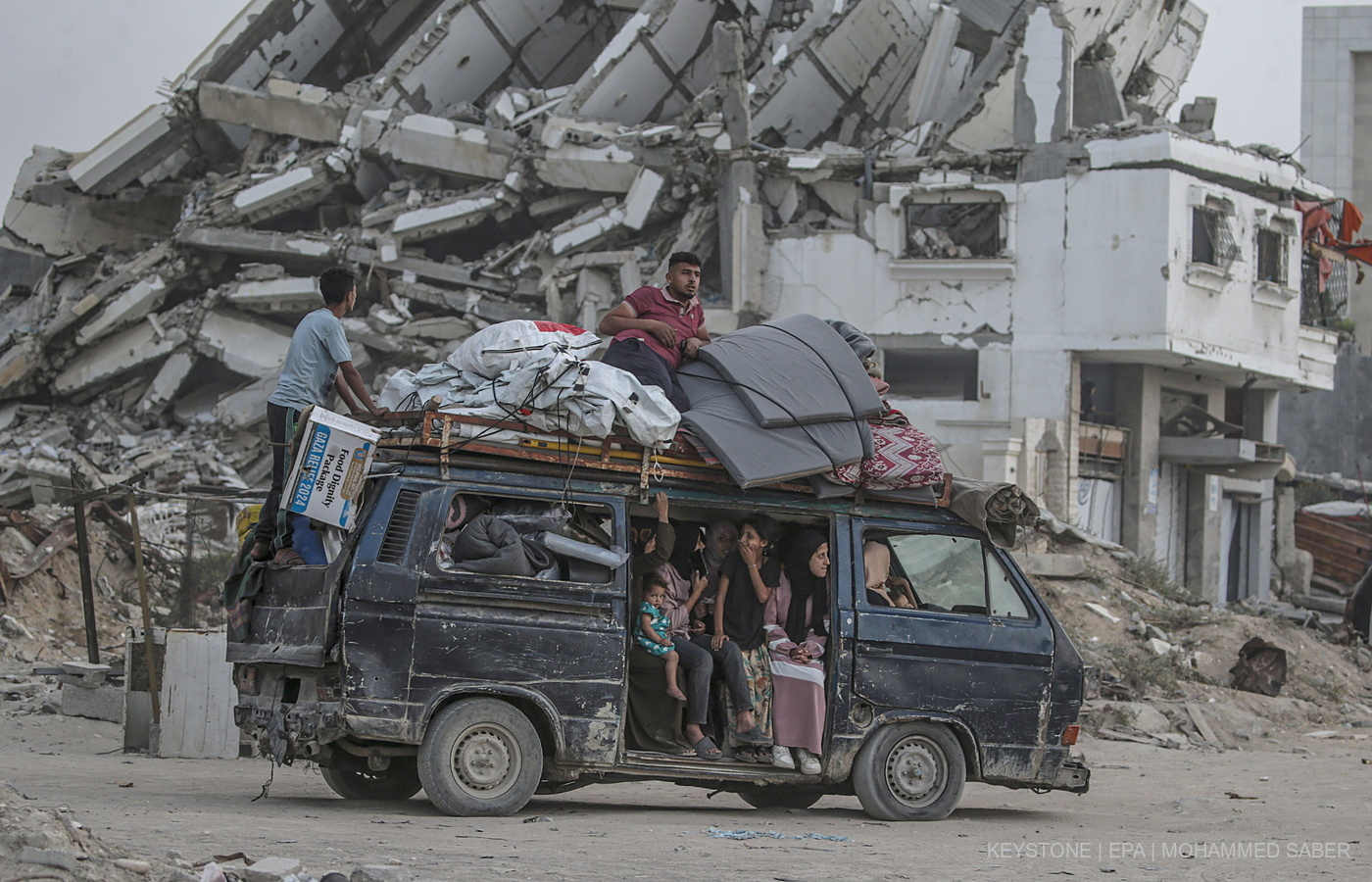
Trapped in the midst of rubble and ashes: Gaza's population is defencelessly exposed to hunger and ongoing offensives – yet Israel's government is massively restricting humanitarian aid. © Keystone/EPA/Mohammed Saber
Joint press release by Alliance Sud, Caritas Switzerland, the Swiss Church Aid (HEKS/EPER), Helvetas, Terre des hommes, Swissaid, and Solidar Suisse
While the first trucks carrying aid supplies have reached the Gaza Strip again this week, the Israeli government continues to restrict vital aid to the civilian population. The number of trucks currently entering the Gaza Strip is far from sufficient to meet the needs of the 2.1 million residents. Simultaneously, the Israeli army is maintaining its ground offensive initiated at the start of the week. It is conducting air strikes in the densely populated coastal strip, forcing the civilian population to evacuate to increasingly smaller areas. Humanitarian facilities and convoys are repeatedly attacked. The situation of the civilian population has reached catastrophic proportions – decisive, internationally coordinated action is required without delay.
The Israeli plan for the provision of humanitarian aid that has become known in recent days is alarming for several reasons: The goods are to be distributed in four "hubs" exclusively in the south of the Gaza Strip and under the sole control of Israel. Long access routes through unsecured and destroyed areas where fighting is still ongoing are placing people in need and aid workers at risk. Aid would be severely restricted and would only be accessible to those undergoing a security check by the Israeli army. Private security companies are to replace independent humanitarian organisations. This plan fundamentally contradicts the neutrality principle of international humanitarian law and links humanitarian aid to political and military objectives. Humanitarian aid must not be instrumentalised by parties to the conflict.
Caritas Switzerland, the Swiss Church Aid (HEKS/EPER), Helvetas, Terre des hommes, Swissaid, Solidar Suisse, and Alliance Sud are calling on the Federal Council to work for the immediate and unrestricted access to humanitarian aid for the civilian population in need and respect for international humanitarian law at various levels:
The people in Gaza need help – now. This is also urgently evident in the projects of Swiss NGOs with their partner organisations in the concerned areas. Switzerland must live up to its humanitarian tradition and promote strict compliance with international humanitarian law.
Contacts:
Alliance Sud
Marco Fähndrich, responsible for communications and media
079 374 59 73, marco.faehndrich@alliancesud.ch
Caritas Schweiz
Livia Leykauf, media spokesperson
076 233 45 04, medien@caritas.ch
HEKS
Lorenz Kummer, media spokesperson
076 461 88 70, lorenz.kummer@heks.ch
Terre des hommes Lausanne
Cyril Schaub, media relations manager
058 611 07 45, cyril.schaub@tdh.org
Share post now
Sahel
25.03.2025, International cooperation
Ibrahim Maïga is a Sahel expert at the International Crisis Group. Alliance Sud asked him what the recent coups in Mali, Burkina Faso and Niger mean for democracy in the region and Switzerland's development cooperation. Interview by Isolda Agazzi.
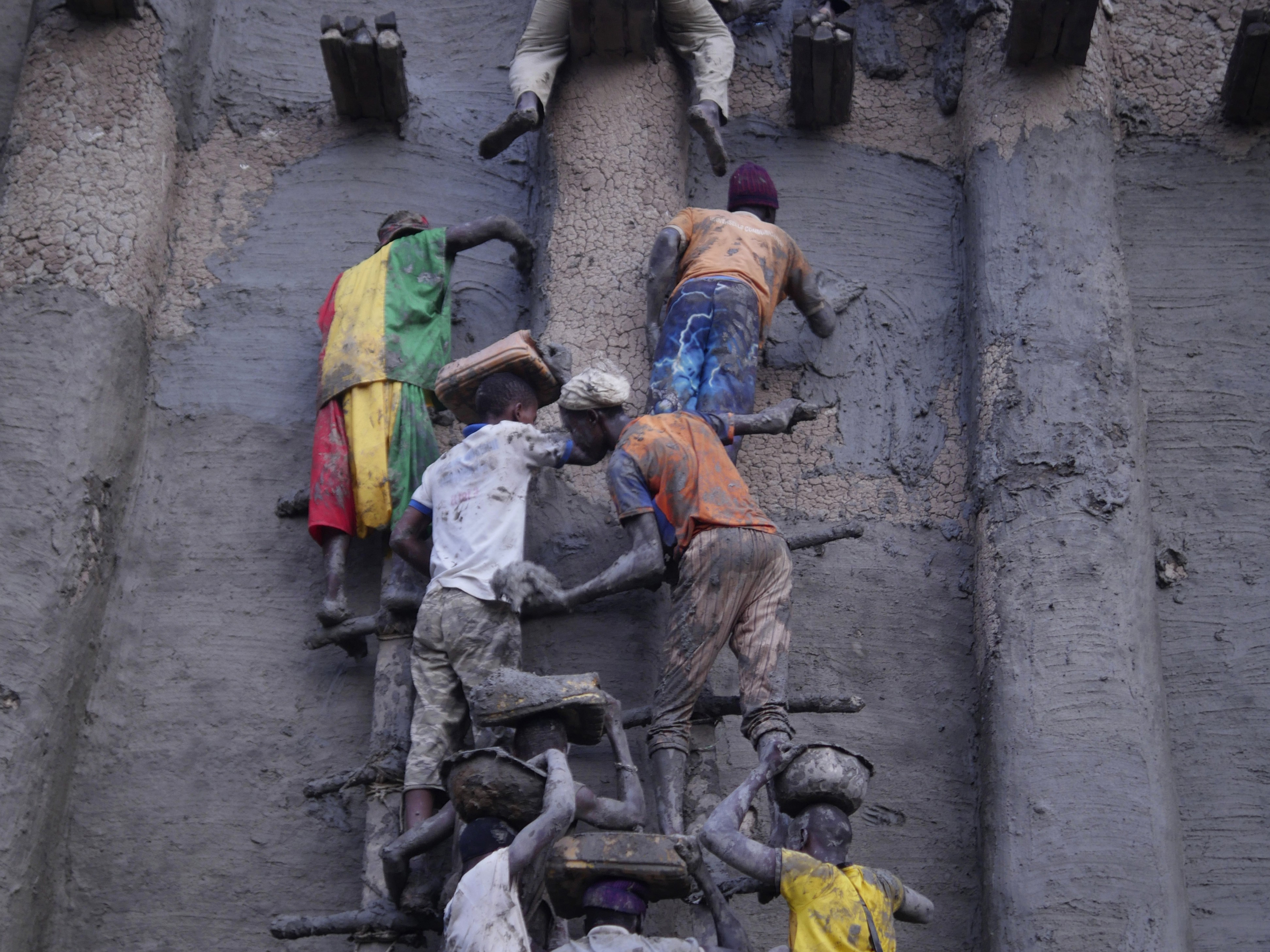
Joint construction work despite fragility: To ensure that it survives the rainy season, people put a layer of clay on the Great Mosque of Djenne, Mali, every year. © Keystone / AP / Moustapha Diallo
According to the Malian analyst, who divides his time between Dakar and Bamako, while the formal democratic model may be foundering, democratic values are still being embraced by the people. It is therefore all the more crucial for Western partners to remain engaged in development projects, as expectations of States have never been higher. Yet the military regimes in place are focusing on the aspect of security, while the "new players", namely China, Russia and Turkey – which are in fact not new at all – are interested in business and military cooperation, and hardly in poverty alleviation.
Alliance Sud: Why are fresh coups again occurring in the Sahel?
We are witnessing the return of the army in the three countries of Mali, Burkina Faso and Niger, which already experienced military coups between 2010 and 2014. Unlike other countries in Africa that have had no military putsches since the 1990s, that was in the not very distant past. Besides, the prevailing security and political conditions constitute fertile ground for interference by the military, who see themselves as saviours. In Mali and Burkina Faso, the situation has been deteriorating steadily for the past 10 years, despite the presence of a substantial international stabilisation facility comprising a UN force, French-led military operations, and education and training missions by the European Union.
This has given rise to twofold disenchantment: first, that of the military in the political players, because, despite substantial investments by civilian regimes to improve the capabilities of the security forces, they have not been able to bring the situation of insecurity under control. This all comes against a backdrop of corruption surrounding the purchase of military equipment. Then there is popular disenchantment in the governing elites, who are seen as corrupt following the revelation of numerous embezzlement scandals in a context pervaded by difficult social and economic conditions.
Isn't the popular support for these military regimes surprising, after the significant pro-democracy movement witnessed in West Africa in the early 1990s?
Indeed, there is a striking contrast between the democratic euphoria of 30 years ago and today's popular support for the military. This is because the democratic model that emerged in the early 1990s following the sovereign national conferences is running out of steam. No regime has materialised with the ability to combine political freedom and economic development. Admittedly, the Mali of the 1990s does not resemble that of today, but the progress has been insufficient.
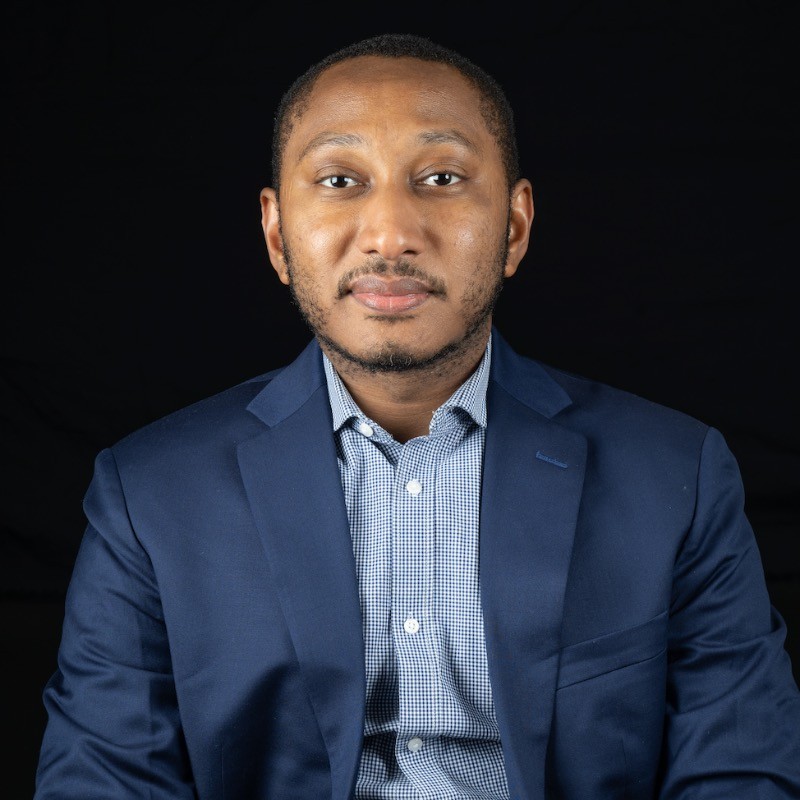
Ibrahim Maïga
Ibrahim Maïga is Senior Adviser for the Sahel region at the International Crisis Group. Previously, he was the Sahel representative at the Netherlands Institute for Multiparty Democracy (NIMD). He also served as Special Advisor to the Prime Minister of Mali on security and governance issues. From 2015 to 2020, he held various positions at the Institute for Security Studies, a pan-African think tank.
Has the liberal system failed – from both a political and an economic standpoint?
It is in any case the failure of an approach, of a governance model based on formal democracy with declaratory constitutions. Public affairs have not always been managed democratically, and this amidst a decline of the rule of law. This part of Africa has been committed to building electoral democracies, in some instances at the expense of consolidating States truly governed by the rule of law. All of this raises doubts about the democratic status of these countries, especially Mali, which was the showcase of democracy in West Africa (along with Senegal and Ghana) until its downward spiral in 2012 [first coup].
I do not believe that the citizens totally reject the democratic model – the topic is ever present in debates and dialogues.
Does this mean that citizens no longer believe in democracy?
I do not believe that they totally reject the democratic model – the topic is ever present in debates and dialogues. However, the practice of democracy involving a party in power that misuses public funds, is no longer acceptable. Instead, most citizens hold fast to the principle of freedom of expression and the people's sovereign choice. This explains why, despite the context of transition, the constitution adopted in Mali in 2023 enshrines democracy as the means of gaining and exercising power.
Yet elections have been postponed indefinitely...
Absolutely. There is a lack of visibility and clarity regarding the time-lines for these transitions, except perhaps in Burkina Faso, where the transition period is expected to end in 2027. The coups occurring in these countries between 2000 and 2020 were followed by short-lived democratic transitions. In Mali it lasted 16 months, in Burkina Faso, 14 months, and in Niger, 15 months.
Today, these transitions purport to be "transformational transitions" as they aim to completely overhaul the country’s "democratic" governance and management so as to identify what works and what does not. The exercise is not futile, but governments are perhaps losing their way in the process, with all the potential abuses associated with holding power for too long. These transitions are also becoming less and less inclusive of all political and social forces. In Niger and Burkina Faso, political activities have been forbidden, and where they are still permitted, there is no dialogue. If the direction of travel is not altered in Mali, the transition could well end in a political impasse.
Are citizens supporting these transitions?
In principle, yes, there is real enthusiasm born of a deep-seated aspiration for change. In 2020, I took part in the national consultations in Mali. The debates were lively, there was a genuine determination to tackle the roots of the problem. They were banking on the ability of a transitional authority, free of certain political constraints and limited in time, to undertake reforms, unlike an elected government, which may be torn between the sometimes contradictory and short-term agendas of its leaders. This has turned out to be more challenging and complex in practice.
The military were expected to improve security, yet things seem to be deteriorating
Security has improved in some places and deteriorated in others. The number of incidents has also increased, as the armed forces are conducting more operations. They now have modern equipment that they did not previously possess, thanks in part to partnerships with Russia, China and Turkey – the latter being the exclusive supplier of drones. These partnerships seem to satisfy the majority of officers and regimes in place, as deliveries are not subject to specific conditions relating to governance and human rights. This gives rise to better equipped and more efficient armies, but also spawns another reality: there are more instances of violence against civilians and a greater risk of collateral victims stemming from the use of drones.
Strengthening security has sometimes overshadowed the challenges relating to education, health or even the economy.
Aren't the increased military budgets and cuts to development cooperation by countries in the North setting back development?
The military regimes have created enormous expectations of the State, which had disappeared in places. Those expectations are being driven by sovereignist rhetoric, which emphasises the primary role of the State in building new roads, infrastructure and providing energy. This rhetoric fuels the belief that States alone can meet these needs, even when they have less funds owing to the political situation and to cuts in development cooperation by the countries in the North and international financial institutions. In Mali, for example, electricity has been an immense challenge for the past two years. Daily life is punctuated with power cuts and the lack of fuel, the economy is not functioning. Strengthening security has sometimes overshadowed the challenges relating to education, health or even the economy.
Does a small country like Switzerland still have a role to play in development cooperation?
Switzerland is, admittedly, a small country, but one with a long-standing tradition of supporting local initiatives. It still enjoys a good reputation, which is not the case of other countries whose cooperation model is being questioned. This relatively favourable opinion and history is conducive to promoting water and power supply projects and to supporting good governance and decentralisation, all of which directly impact the lives of people. Its links with non-State players – civil society organisations, youth and women's organisations – is also an asset even if this is not specific to Switzerland. All this gives a certain legitimacy to its presence in the region.
Like all the players, however, Switzerland is confronting a fairly pronounced change: the region has evolved from one where the international stabilisation facility was crucial – with a strong presence of the UN, the African Union and other partners, especially France – to become an environment where the protagonists are the States. The initial thinking was that it would be possible to circumvent States and work only with civil society and non-governmental organisations, but States are still proving indispensable. They are now back in the driving seat.
Western donors like Switzerland have a role to play in the realm of advocacy, they should continue to support development.
Should foreign donors work with non-democratic regimes?
It's a complex dilemma, but the situation will not be improved without efficient States. There is already cooperation with the military regimes, though at times on a smaller scale and in regard to technical matters. Hence, the question is more one of deciding how far the collaboration should go. Western donors like Switzerland have a role to play in the realm of advocacy, they should continue to support development. It is better to remain engaged and take the opportunities and openings where they arise. We are perhaps evolving away from the major problems that have plagued the foreign relations of these regimes up to now, towards realpolitik and the realisation that they need countries like Switzerland, which have a long tradition in tackling non-security challenges. Taking a long-term view is one way of keeping citizens on side, as their memory is longer than that of institutions. This is all the more so considering that non-engagement comes at a price – that of being displaced by strategic competitors.
How do you see long-term relations with China, Turkey and Russia?
There is talk of new allies, but in reality, they are not all that new. These countries have long-standing relations with the Sahel – Russia at least since those countries became independent. There is also China, driven, for example, by its interest in rare earths or its investments in oil in Niger and sugar in Mali, and this is all set to continue. Turkey has new ambitions and is not limiting itself to drone sales to the armies. In Niamey, the new airport and the Radisson Hotel were built by the Turks in the past 10 years. These projects are part of a long-term approach that is likely to continue. For now, however, these players are not involving themselves in the same fields as Westerners, starting with development assistance. For them, it is business first and foremost, with the Sahel countries paying cash for their purchases of military equipment. The biggest contributor of development assistance in Mali is the United States. Should the 90-day freeze on American aid decreed by Donald Trump be prolonged, that would compound an already precarious situation. It is hardly likely that the Europeans will replace the Americans in this realm, and even less so the Chinese or the Turks.
Share post now

global
The Alliance Sud magazine analyses and comments on Switzerland's foreign and development policies. "global" is published four times a year (in german and french) and can be subscribed to free of charge.
US wrecking ball and Switzerland
20.03.2025, International cooperation
The dismantling of global US involvement must be of concern to Switzerland, writes Andreas Missbach. The repercussions on multilateralism and development cooperation and, by extension, on the poorest countries in particular, are serious. Against this backdrop, the Federal Council cannot opt for business as usual.
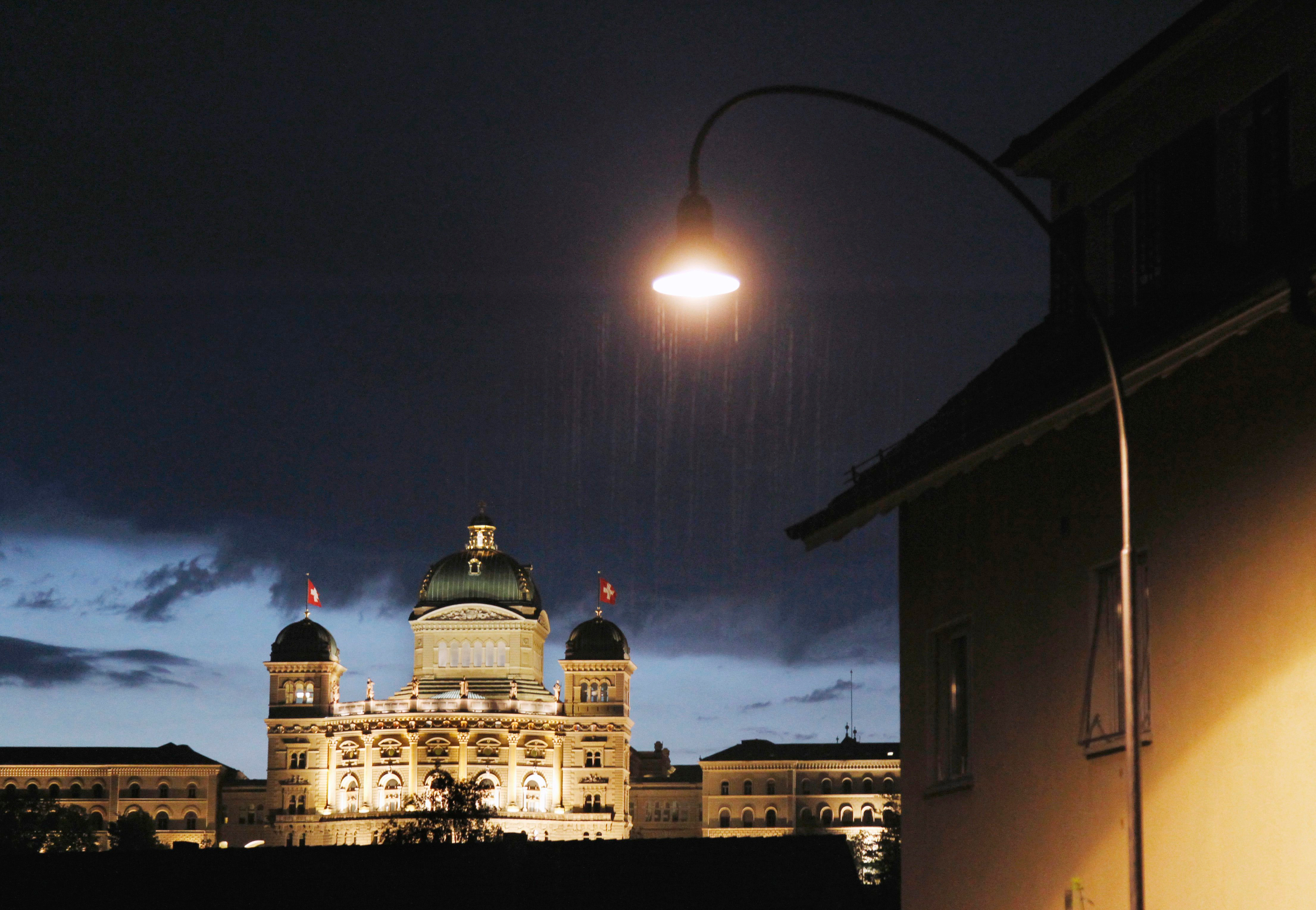
The USA is withdrawing, the global upheavals are immense. In Berne, the Federal Council remained silent as time passed, politicians are showing no outrage. © Keystone / Anthony Anex
"Other than China's Cultural Revolution, history offers few parallels to the so-called Department of Government Efficiency's assault on the state", the Financial Times wrote. In the light of the power grab in the USA, we are at a loss not only for suitable comparisons, but at times also for words; let's have a try with pop culture: "I came in like a wrecking ball" (Miley Cyrus).
It is pointless trying to keep an overview of all that has fallen victim to the wrecking ball. Let us therefore select something that gets little coverage in Switzerland, although it could have major implications here at home: pausing enforcement of the Foreign Corrupt Practices Act, the US anti-corruption law. It is only thanks to the application of that law that we know the meaning of cash in Baar, which is that up until 2016, there was a counter at the Glencore headquarters where staff members could collect bribes. And thanks to that enforcement, Glencore was fined USD1.1 billion after admitting guilt. In the absence of this menacing posture by the "new sheriff in town", there is great temptation to revert to tried and tested practices in commodity trading. This would have catastrophic ramifications for the poorest countries and their people.
To continue with the pop culture theme, what prevails in Switzerland is "The silence of the lambs" (Director Jonathan Demme). Of the seven lambs to be more precise. It took almost two months for anything to be heard from Berne: "The Federal Council takes the geopolitical situation seriously", followed immediately by: "Switzerland's foreign policy has not changed". According to media reports, the Federal Council had before it a discussion document that was believed to address the USA's withdrawal from the WHO, the UN Human Rights Council, and the Paris Climate Agreement; it is understood that it also covered the implications of the ending of USAID payments. Yet the official statement made no mention of this, with the Federal Council opting instead for "business as usual", and attempting the Swiss variant of "the art of the deal": "Switzerland's strategy must be to keep the doors open to the EU, the USA and China." (State Secretary Helene Budliger Artieda, Director of State Secretariat for Economic Affairs).
While the dismantling of the world's largest development agency constitutes a hurricane in the Global South, in Switzerland it is still just a gale. Where is the political outrage? Vitally important projects by Swiss development agencies worth CHF100 million can no longer be continued. Nothing will be the same as before: "If this is the beginning of the end of aid, we should focus on structural transformation", writes Heba Aly, the Canadian-Egyptian former CEO of the New Humanitarian online portal. "Fairer trade, debt and tax policies can address the drivers of inequality." That is now the crux of the matter. And for Switzerland this means anything but business as usual.
Share post now

global
The Alliance Sud magazine analyses and comments on Switzerland's foreign and development policies. "global" is published four times a year (in german and french) and can be subscribed to free of charge.
Analysis of the demise of USAID
17.02.2025, International cooperation
Much has been written in recent days about the dramatic dismantling of the American development agency USAID. It is now clear that not only was the agency destroyed in an undemocratic and unlawful manner, but that moreover, the decision is having worldwide repercussions. Despite its much-vaunted humanitarian tradition and advocacy of multilateralism through international Geneva, official Switzerland is still noticeably silent.
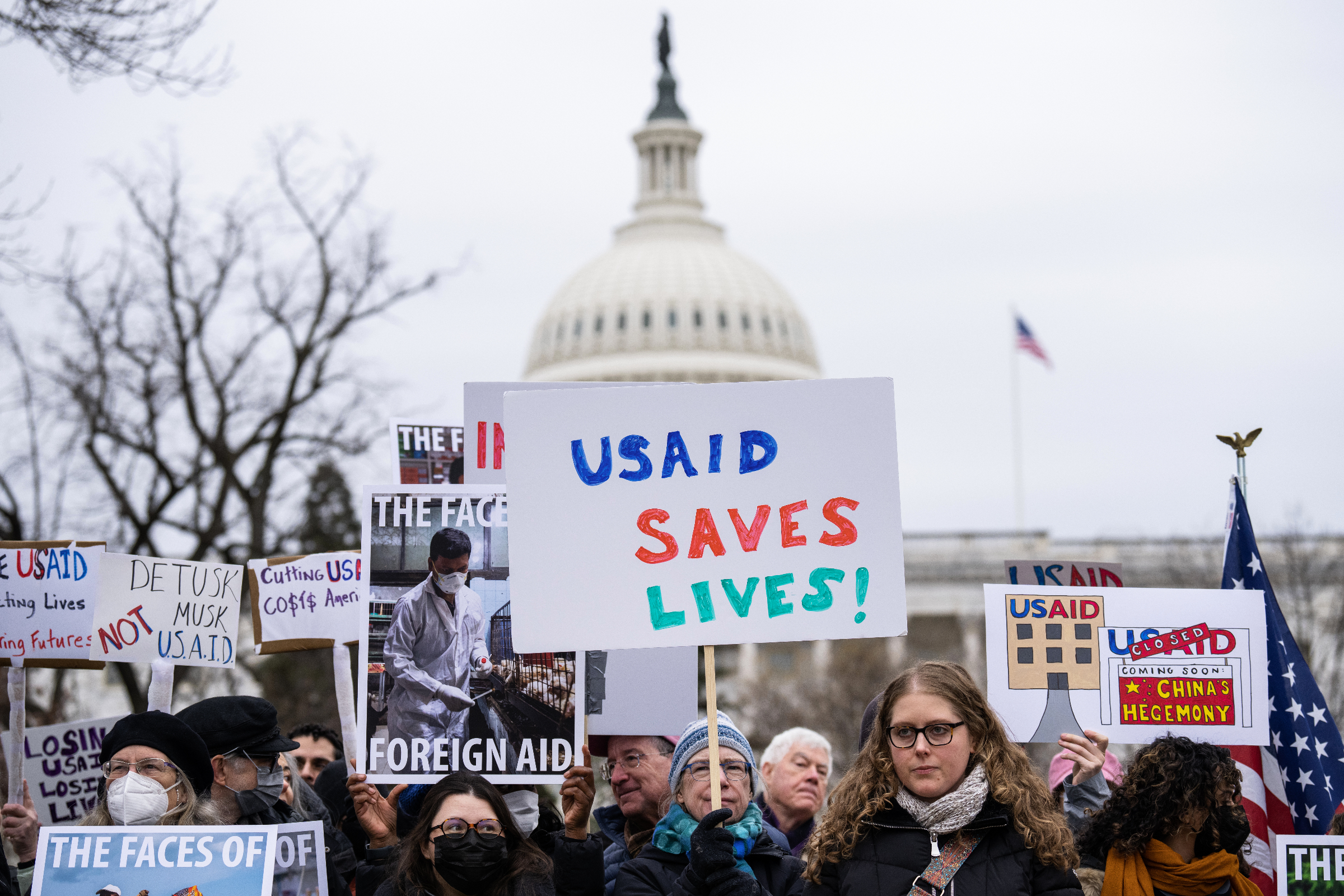
Protesters call on US Congress to rescue USAID. © KEYSTONE / CQ Roll Call / Newscom / Tom Williams
The US development agency USAID was founded in 1961 by John F. Kennedy. It has since grown into the world's largest development agency. With an annual budget of USD 40 billion (less than 1% of US government spending), it accounts for roughly 40% of total official development spending by all countries in the Organisation for Economic Cooperation and Development (OECD). Now, in a few short weeks, it has been completely incapacitated. Elon Musk – the world's richest man with no official mandate now at the helm of Donald Trump’s Department of Government Efficiency (DOGE) – is leading the charge against USAID. In a series of hate-filled tweets, he called the development agency a "ball of worms", "a viper's nest" or a "criminal organisation", and said it was time for it to die. It is understood that shortly thereafter he ordered the sending of an email to all employees requesting them to stay at home. Then came one blow after another. Senior managers were dismissed or sent on leave. Suddenly, the USAID website, its X account and staff email accounts were no longer accessible. Besides, Musk obtained unlawful access to sensitive agency data when a group of young IT specialists (the so-called "DOGE kids") defied the instructions of the security staff and aggressively made their way into the offices of the US agency. In the same manner, the DOGE kids procured sensitive data from the departments of health, education and finance. Senator Chuck Schumer described the group as "an unelected shadow government ... conducting a hostile takeover of the federal government”.
Although the development programmes were officially paused for just 90 days, and "life-saving humanitarian programs" could apply for special waivers, the actions of Trump and Musk give every indication that the USAID is unlikely ever to be resuscitated. Consequently, a number of partner organisations have announced that they would be unable to continue the programmes despite their special waivers, as Musk's DOGE kids have paralysed the organisation's entire payment system. In addition, Trump has meanwhile issued a new government decree ordering the agency to cease granting further waivers. Cynically, only military aid to Israel and Egypt continues unchanged. In the meantime, all employees have been instructed to return home to the USA, the "USAID" letterhead has been removed from the New York office, and official communications now refer to the agency as the "former USAID". In just a few weeks, an agency that was created by the American Congress, and whose budget is approved annually by Congress, was fed "into the wood chipper" by an unelected government representative (to use Musk's own words). Although numerous lawsuits have now been filed in the USA against the actions of Trump and Musk, it is not clear whether these will have any real impact, because, on the one hand, much of the judiciary is dominated by Republicans, and on the other, statements by President Trump and his Vice-President Vance suggest that any court rulings intended to curtail Trump's executive power will be ignored.
The shutdown of USAID is catastrophic not just from the standpoint of democracy, but it is also having serious repercussions around the world. Because the USAID conducts numerous projects jointly with other organisations, the international development system as a whole is being severely undermined. In addition to some 10 000 USAID employees who lost their jobs more or less overnight, thousands of jobs have already been slashed also in partner organisations that implement projects for USAID. Estimates are that more than 50,000 jobs have already been lost and that this number will climb to over 100,000 in the months ahead. Various Swiss NGOs, too, will have to lay off several hundred local employees. Many smaller partner organisations in countries of the South have already ceased operating altogether.
It is no exaggeration to state that the shutdown of the USAID holds life-threatening implications for millions of people. One example is the realm of healthcare, where USAID plays a pioneering role: its disappearance means that millions of people will now no longer be receiving vital medicines. The African Health Agency Africa CDC anticipates that there will be two to four million deaths per year as a result.
The abrupt closure of the USAID has meant, among other things, that tonnes of food are now rotting in warehouses as hundreds of thousands of children await their school meals, or that 11.7 million girls and women have no access to contraceptives. This considerably heightens the risk of unwanted pregnancies and childbirth complications.
Independent media coverage, too, will be severely impacted in many countries. In the year 2023, for example, USAID funded training and support for 6200 journalists, assisted 707 non-governmental news broadcasters and 279 civil society organisations that work to strengthen independent media in more than 30 countries, including Iran, Afghanistan and Russia.
Clearly, neither Trump nor Musk cares about the demise of many NGOs in the Global South. In this country, too, some opponents of development cooperation are already rejoicing and wishing to see the Swiss Agency for Development and Cooperation eliminated. But the abrupt closure of USAID also harbours serious medium-to-long-term security risks – indeed globally.
USAID, for example, is largely responsible for monitoring and containing the Ebola virus in West Africa and also for the surveillance of avian flu in 48 countries. Combined with the withdrawal of the USA from the World Health Organisation, this shutdown has lethal implications and the risk of a global pandemic is growing.
The discontinuation of vital emergency relief in war-torn and crisis regions can also quickly lead to new waves of migration. Various experts are already warning that the vacuum left by the dismantling of USAID will benefit countries like China and Russia, which will now gladly step into the breach with the usual anti-Western rhetoric.
The dismantling of USAID comes as the worldwide climate crisis worsens and the attainment of the Sustainable Development Goals (SDGs) proves ever more elusive. The OECD now estimates the funding shortfall for attaining the SDGs by 2030 at USD 6.4 trillion. In parallel, several European countries, including Switzerland, have cut development spending in recent years, and the international climate finance gap is growing steadily wider.
A rising number of countries are currently entrenching themselves behind their own national interests, and far-right propaganda seems to have regained social acceptability in many places. Besides affecting critical accomplishments in the areas of diversity, gender justice and the fight against racism, this is also strongly impacting development cooperation.
The global development system is certainly in need of reform – local players, for example, must have a greater role in designing and implementing projects. An open discussion on the future of development cooperation is to be welcomed. What has befallen USAID, however, is the exact opposite. The radical policies of Trump and Musk clearly demonstrate not just the massive worldwide repercussions of the abrupt elimination of a development agency, but also how quickly a democracy can be damaged and extreme right-wing ideology and rhetoric can take hold.
It now seems all the more important for countries like Switzerland, which are happy to brag about their democracy and their humanitarian values, to take a clear stand and strongly condemn the dismantling of USAID. Moreover, as host to an international cooperation hub in the form of international Geneva, Switzerland should now make common cause with other donor countries to financially cushion the loss of USAID and position itself over the long term as a defender of multilateralism and democracy. This is the only way that the crisis into which Trump and his acolytes seem to be plunging the entire world could yet perhaps represent an opportunity.
Share post now
Tied aid
29.11.2024, International cooperation
For decades, aid tied to countertrade transactions has been frowned upon in international cooperation. Donor countries seem hardly bothered by it, however. On the contrary. In Switzerland, too, tied aid is again becoming acceptable. An analysis by Laura Ebneter
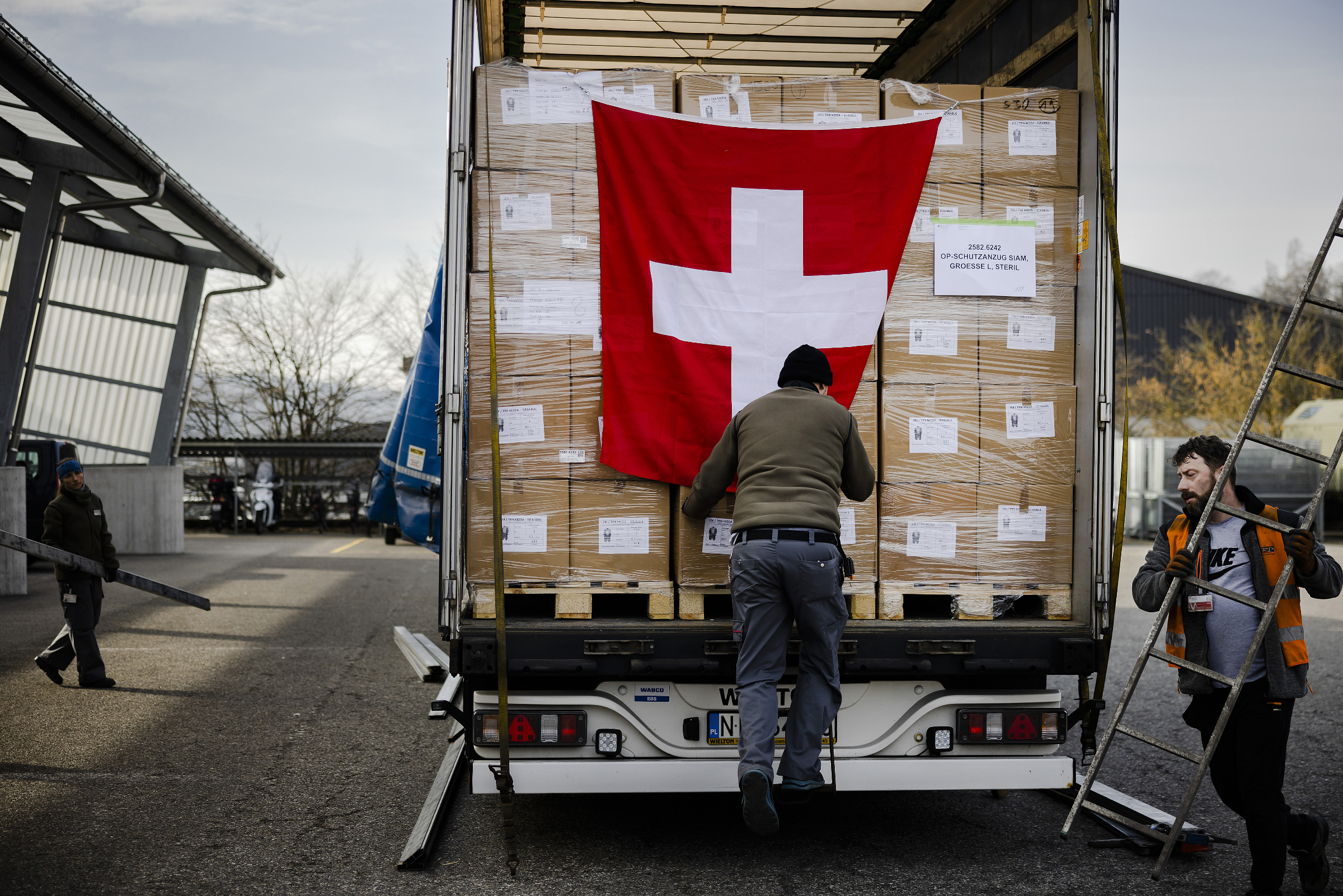
No economic aid for Swiss companies yet: In March 2022, after the start of the major Russian offensive against Ukraine, Switzerland delivers humanitarian aid. © Keystone / Michael Buholzer
In an interview with Swiss Radio and Television SRF in the summer of 2024, Helene Budliger-Artieda, Director of the State Secretariat for Economic Affairs (SECO), said the following: "In our work of development cooperation, we strive primarily to place orders in the local economy. But this is about reconstruction [in Ukraine]. In this case, we have a different logic". The interview was about the Federal Council's plans for supporting Ukraine. The Federal Council has earmarked 1.5 billion francs for support to Ukraine over the next four years. Of this amount, 500 million is to benefit Swiss companies operating in Ukraine. Is this still development cooperation or is it export promotion?
This is an instance of tied aid, which is frowned upon. The term covers development funds that are made conditional on the procurement of goods and services from donor countries. This is why it is often referred to as shopping vouchers. The partner countries are left no choice: in an emergency, we also accept Migros shopping vouchers, even if this harms our own village shop, which would be much more important for locals in the medium term.
All available estimates arrive at the same conclusion – if goods and services must be bought in donor countries, projects cost 15-30% more than if countries are able to choose a supplier. Yet, cooperation without countertrades enhances more than just efficiency in the use of funds and self-determination on the part of partner countries. Promoting local markets and companies also generates positive stimuli that go beyond project outcomes. If local suppliers are used, it becomes less problematic to obtain spare parts, as the supply chains are significantly shorter. Maintenance costs will otherwise be higher and can jeopardise long-term success if funds are lacking upon completion of the project.
Tied aid is part of a decades-long debate on the effectiveness of development financing. In essence, it is about two closely related concerns. One is future-oriented international cooperation based on principles of effectiveness and efficiency. This means that the debate on tied aid also has a bearing on the decolonisation agenda, in that partner countries should be able to determine their own development path. The other relates to the potentially distorting effects of tying allocated funds to the export of goods and services from donor countries.
It is also about a level playing field. After all, those countries that forego the practice of tied aid – instead putting their contracts up for international tender – justifiably assert that they would be at a disadvantage if other countries failed to follow suit. Hence, Swiss suppliers, for example, have only limited access to other markets, while international suppliers have ample access to Switzerland's procurement system.
To facilitate international coordination, donor countries agreed in 2001 on the "Recommendation on Untying Official Development Assistance (ODA)" in the OECD framework. The purpose of that common agreement was and remains that of providing as much untied development funding as possible, thereby rendering international cooperation more efficient and effective. There is agreement in the international community, after all, that this form of public development financing is paternalistic, costly and inefficient.
Official figures for untied aid show that so far, Switzerland has a good record compared to other countries. According to an OECD analysis, 3% of the funds provided by Switzerland in 2021 and 2022 was tied. Yet, the picture presented by the analysis is an incomplete one, as the figure only includes funds that were formally tied. There are, however, also informal ways of giving preference to domestic providers. The pool of candidates can be controlled, for example, by means of the language used in the tender, the financial scale of the projects or the choice of communication channel.
There is no precise overview of the extent of informally tied aid. However, procurement statistics can form the basis for estimating the portion of the funds up for tender that goes to domestic providers. Assessments by Eurodad, the European Network on Debt and Development, show that 52% of all untied funds were awarded to donor country suppliers in 2018 – this being the most recent data available. At 51%, Switzerland is about average. Overall, only 11% went directly to suppliers in partner countries.
Untied aid had long been free of controversy in Switzerland. The current draft of the International Cooperation Strategy (IC strategy) 2025-2028 states: "It [IC] is in line with international trade law, which aims to prevent trade-distorting subsidies in favour of Swiss companies. […] Switzerland takes account of the content of the OECD-DAC Recommendation on Untying Official Development Assistance". Yet, in the light of the decisions regarding Ukraine funds going to Swiss companies, this affirmation seems to be playing to the gallery, for just weeks after the publication of the IC strategy, the Federal Council wrote in a press release: "The Swiss private sector is to play a key role in Ukraine's recovery." This project also signals Switzerland's intention to formally reintroduce tied aid (see also here).
Under OECD guidelines, core contributions to non-governmental organisations from donor countries are not regarded as tied aid, as NGOs operate in the public interest and on a non-profit basis. Internationally, however, this preference is controversial. In recent months, the international #ShiftThePower movement has called for more development funds to go directly to organisations in the Global South. While this call is entirely justified, a more detailed look at how funds can reach partner organisations in the Global South is warranted. The fact is that putting more projects and programmes up for international tender does not automatically mean that organisations in the Global South will win bids. It is therefore crucial to ensure that award processes are created that pave the way for smaller organisations in the Global South to receive core funding and not remain in the role of project implementation partners. Swiss NGOs in particular, all of which have long-standing, solid and trusting partnerships with countless organisations in the Global South, play a crucial bridging function in this context.
Many countries make no secret of the fact that they tie their development funding to foreign policy interests. Carsten Staur, the Danish Chair of OECD Development Assistance Committee, said in an interview in 2022 that there has never been any official development assistance in history that has not pursued foreign and security policy aims in one way or another.
Interestingly, those calling for tied aid in Switzerland are the very same political parties that otherwise champion liberal trade rules. But suddenly these rules are no longer to apply to IC. Moreover, such policy decisions mean that those claiming that international cooperation is not effective are in part responsible for the possibility that international cooperation funds may be deployed less efficiently.
If cooperation is to be sustainable and effective and is to take place on an equal footing, partner countries must be able to shape their own development paths. Believing that we in Switzerland should determine what partner countries "need" is failing to do justice to the international debates on forward-looking international cooperation. It should also be clear that tied aid is inefficient and costly. It is therefore high time once again to abandon this approach and invest in long-term partnerships on an equal footing.
The term "tied aid" describes a situation where the provision of funds is made conditional on the purchase of goods and services from suppliers in the donor country. But other forms of conditionality also exist, such as stipulations by donor countries regarding anti-corruption measures, free trade and deregulation policies, or the observance of democratic principles. Attaching conditionality to development funds is also a strategic tool with which to pursue foreign policy goals in the countries of the Global South. This is rarely well received in partner countries, however, as it interferes with their right of self-determination. This in part explains the popularity of new donor countries like China, which make few or no stipulations at all.
Share post now

global
The Alliance Sud magazine analyses and comments on Switzerland's foreign and development policies. "global" is published four times a year (in german and french) and can be subscribed to free of charge.
International Cooperation Strategy 2025-2028
21.06.2024, International cooperation, Financing for development
The Federal Council adopted the long-awaited Dispatch on the 2025–2028 International Cooperation Strategy in mid-May. In it, the Council stands by its policy of funding aid to Ukraine at the expense of the Global South, thereby ignoring the outcomes of the public consultation.
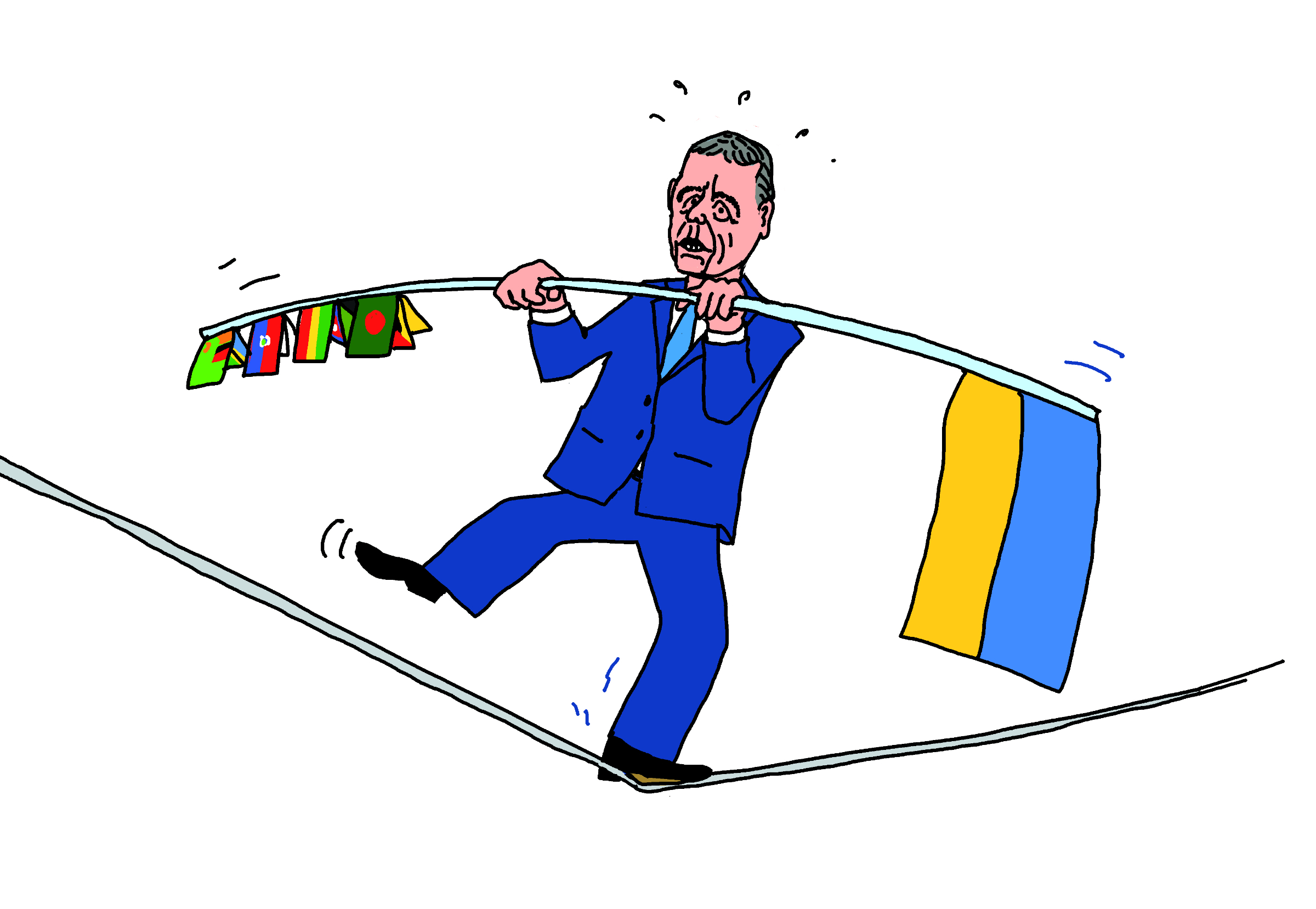
© Ruedi Widmer
In terms of content, the Government makes no significant headway and relies on tried and tested themes and implementation approaches in the 2025–2028 Strategy. And this in a world which, according to the Strategy, is more fragmented, unstable and unpredictable. In this context, the Federal Council opts for more flexibility – its word of the moment. We need flexibility to cope with the current crises, said Federal Councillor Ignazio Cassis at the press conference. But anyone reading the Strategy will soon realise that flexibility merely means funding the entire CHF 1.5 billion in aid for Ukraine from the International Cooperation (IC) budget, and that the amounts for other countries and programmes will therefore be "flexibly" cut back.
At the press conference on 10 April on the Bürgenstock Peace Conference and aid to Ukraine, Federal Councillor Ignazio Cassis had already spoken of the continuous reallocation of resources in international cooperation. Resource allocation was a strategic, dynamic process and not a static approach. Such a dynamic approach can certainly be useful, for example, when it comes to flexibly interlinking the three pillars of international cooperation, namely, humanitarian aid, development cooperation, and peace building (the term 'nexus' is also used). In any case, the boundaries between these areas are often fluid.
International cooperation that constantly shifts its resources between different regions and countries cannot build serious, long-term partnerships. Yet, this is precisely what is needed to operate effectively and efficiently. It takes trust and long-term commitment, in other words, relations that are forged and preserved through development cooperation programmes. Or, as Federal Councillor Cassis said during a dialogue with NGOs in 2022: "Reliability, trust and predictability". If Swiss international cooperation becomes a geopolitical pawn, it will lack the networks and staffing it needs on the ground. The war in Ukraine has marked a turning point, but this ought not to become a reason for Switzerland’s international cooperation programme to jettison what has been built up and jointly achieved with partner countries over many years.
In deciding to fund aid to Ukraine from the international cooperation budget, the Federal Council is dealing several blows at the same time. First, it is a refusal addressed to the Global South, which for years has been calling on wealthy countries to meet the internationally recognised target of 0.7% of gross national income for official development assistance (ODA). Under the Federal Council's proposal, Switzerland's ODA (not including asylum costs) will be 0.36% in 2028. Where, then, is the much-vaunted humanitarian tradition when it is needed?
Another rejection is directed at those who took part in the consultation process. An overwhelming 75% majority of the organisations, parties and cantons that responded to a relevant question stated expressly that aid to Ukraine must not be at the expense of other IC regions and priorities such as Sub-Saharan Africa or the Middle East. No political party supports the funding of Ukraine's reconstruction from IC, except for the Swiss People’s Party (SVP), which, to go by its party programme, wants to dispense with development cooperation altogether. Unfortunately, in the wrangling over federal finances, the Parliament has so far failed to identify ways of implementing this, that could attract majority support.
Foreign observers have not failed to notice that Switzerland is relaxing with its comfortable and lucrative special status as a neutral country, while failing to play a substantial enough role in Ukraine's defence, whether in the form of military or humanitarian support. With a debt ratio of 17.8% of gross domestic product, Switzerland cannot credibly explain to the international community its inability to come up with additional funds for Ukraine. At the same time, through their funding proposals for upgrading the army and for a 13th OASI pension payment, the SVP and the FDP (The Liberals) are peddling the idea that Switzerland can simply renege on its international obligations.
Switzerland is thus increasingly isolating itself and becoming internationally irrelevant. Goodbye mediator role, goodbye humanitarian tradition and reliable partner. The Federal Council has correctly read the signs of the times, but has opted for the path of isolation. That is why only the Parliament can now act to remedy the situation and bring about a change of direction for Ukraine and the Global South.
Share post now

global
The Alliance Sud magazine analyses and comments on Switzerland's foreign and development policies. "global" is published four times a year (in german and french) and can be subscribed to free of charge.
Peace policy in Colombia
21.06.2024, International cooperation
For the first time two years ago, Colombia elected a President, in the person of Gustavo Petro, who did not come from the old elites. In a country where huge swathes of territory are still controlled by armed groups, his government has set an ambitious goal, that of "Paz Total" – total peace.
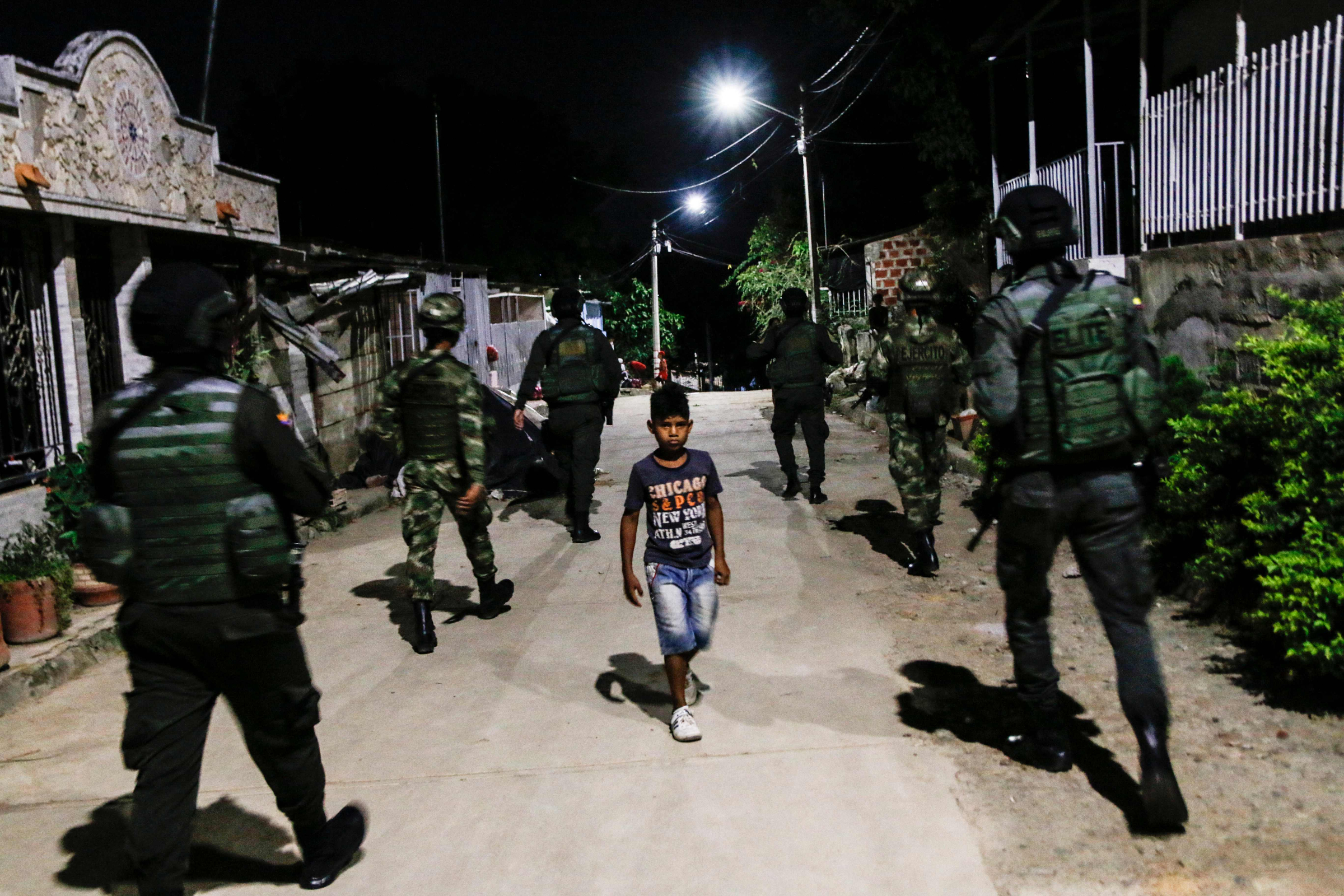
A child walks between patrolling Colombian soldiers at a checkpoint on the Colombian-Venezuelan
border in Cucuta. © Schneyder Mendoza / KEYSTONE / AFP
At the end of March, Alliance Sud member organisation Swissaid organised a trip for a delegation of parliamentarians from four parties. Alliance Sud also went along. The peace process was a key topic at the numerous meetings held with Swiss NGOs, Colombian civil society, government agencies and members of the Swiss Embassy.
Gustavo Petro's election in 2022 was historic. For the first time in Latin America's longest-standing democracy, the man who took the reins of power, unlike all his predecessors, did not come from the dominant parties of the elite and from the group of 30 families that controlled Colombia. Yet, the ex-guerrilla fighter, who did prison time in the 1980s and is backed by a broad civil society coalition, has no majority in the parliament. His government's task is also not being facilitated by the influx of more than 3 million people fleeing Venezuela for Colombia.
Colombia experienced yet another historic event in 2016 when, after years of negotiations with the guerilla forces of the FARC-EP (Fuerzas Armadas Revolucionarias de Colombia – Ejército del Pueblo), a peace treaty was concluded and 14,000 fighters (40 per cent women) surrendered their weapons. This did not bring peace to the country, however; not only are there problems with implementing the peace agreed with the FARC-EP, but armed groups continue to control vast areas of the country. The "Paz Total" solution proposed by Petro and enthusiastically advocated by government representatives and civil society, is more than ambitious. But it goes to the heart of the matter: without a peace that also encompasses the economic and social development of a hinterland in total neglect, and without a civil society that can function in the absence of death threats and assassinations, there can be no lasting peace.
Regrettably, things are moving in the wrong direction in many areas, which are witnessing a resurgence of armed violence. There are various reasons for this. The State failed to fill the vacuum left behind in many regions by the FARC-EP following demilitarisation. FARC splinter groups and other formations took over. There had been no real disarming of the paramilitary forces, which had been backed by the army in their fight against the guerrilla forces and the population in order to safeguard the interests of landowners; and, of course, the greatest scourge of Colombia and neighbouring countries – cocaine. Mexican drug cartels now control large parts of the "supply chain". The dividing lines between paramilitary forces and the armies of the cartels are just as fluid as those demarcating some guerrilla groups.
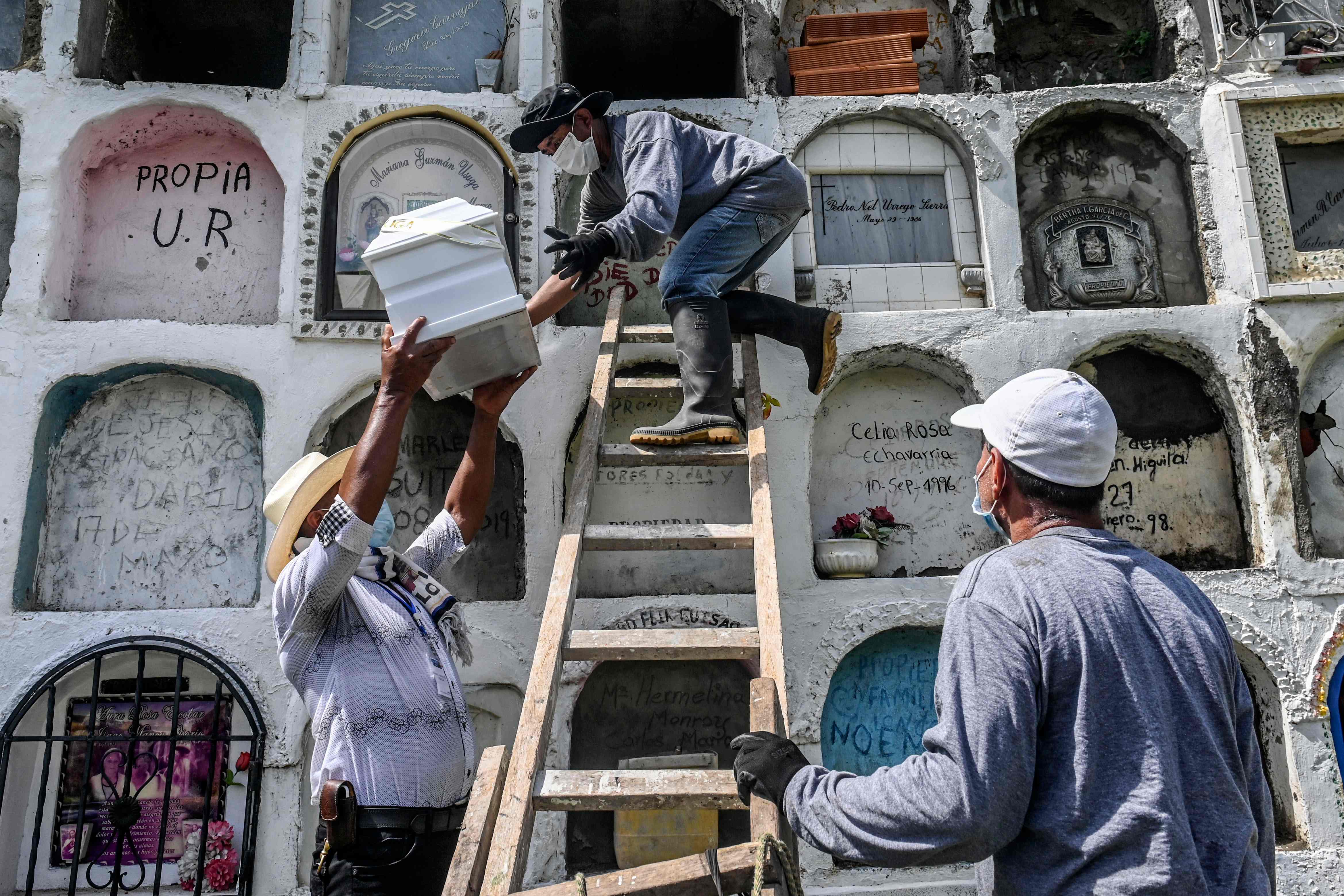
A relative of a victim of the Colombian conflict hands over the urn containing the mortal remains to a gravedigger at the cemetery in Dabeiba, Antioquia department. © Joaquin Sarmiento / KEYSTONE / AFP
Peace negotiations with armed groups are a crucial part of the Total Peace agenda. Switzerland has been engaged in Colombia since 1998, and most recently through all three "arms" of its international cooperation programme: the Swiss Agency for Development and Cooperation (SDC), the State Secretariat for Economic Affairs (SECO) and the Peace and Human Rights Division (PHRD). Since 2022, the Petro Administration has been negotiating with the rebel group ELN (Ejército de Liberación Nacional), and since 2023, with the EMC FARC-EP (Estado Mayor Central de las FARC-EP), a FARC splinter group that had not participated in the 2016 peace arrangement. Switzerland is an accompanying State in the process with the ELN, and a guarantor State in the case of the EMC FARC-EP, in each case jointly with other European countries and, as the name suggests, more intensely with the EMC FARC-EP.
In both cases, Switzerland is present at the negotiations and, according to the PHRD, advises the negotiating parties on the topics of process design, ceasefire, participatory mechanisms, communications, dealing with the past, and protecting civilians. On account of the sluggish implementation of the peace agreement with the FARC-EP, which contains more than 500 specific points, partial agreements are to be negotiated this time round, so that they can be implemented separately. Similarly, the talks are not being conducted at a central location abroad but in a decentralised manner in the regions concerned, and this makes for broader participation.
One major stumbling block to the current negotiations is the incomplete implementation of the 2016 peace agreement. The guerrilla fighters are understandably mindful of this at the negotiating table and do not wish to end up in the same place. The agrarian reform measures were those least implemented; only 7 per cent of them were fully implemented, and 18 per cent partially. This shows that traditional development cooperation methods are crucial to securing lasting peace.
The withdrawal of SDC from Latin America is reducing engagement in Colombia, even though Switzerland retains a presence through humanitarian aid and the PHRD. In 2021, there was more funding available for SDC bilateral cooperation than for the work of the PHRD. Overall support declined from 33 million (2021) to 20 million francs (2023), though the amount for the PHRD increased slightly. SECO also plans to withdraw fully by 2028. Instead, Morocco will become the new priority country. In this regard, the draft IC Strategy 2025-2028 states meaningfully that this is in keeping with the stronger geographical focus and facilitates the move towards other foreign economic policy instruments.
It is doubtful whether, with less funds – we cannot downplay the impacts of more planned cuts owing to the reallocation of IC funds to Ukraine – Switzerland will be able to continue to play its key role. The projects being carried out by Swissaid and other Swiss NGOs to strengthen civil society and rural development in Colombia are more crucial than ever.
Share post now

global
The Alliance Sud magazine analyses and comments on Switzerland's foreign and development policies. "global" is published four times a year (in german and french) and can be subscribed to free of charge.
Interview with former Foreign Minister Micheline Calmy-Rey
21.03.2024, International cooperation
In these times of crisis, former Federal Councillor Micheline Calmy-Rey finds that Switzerland's diplomacy lacks a clear stance. As guarantor of the Geneva Conventions, Switzerland should step up its involvement in support of civilians.
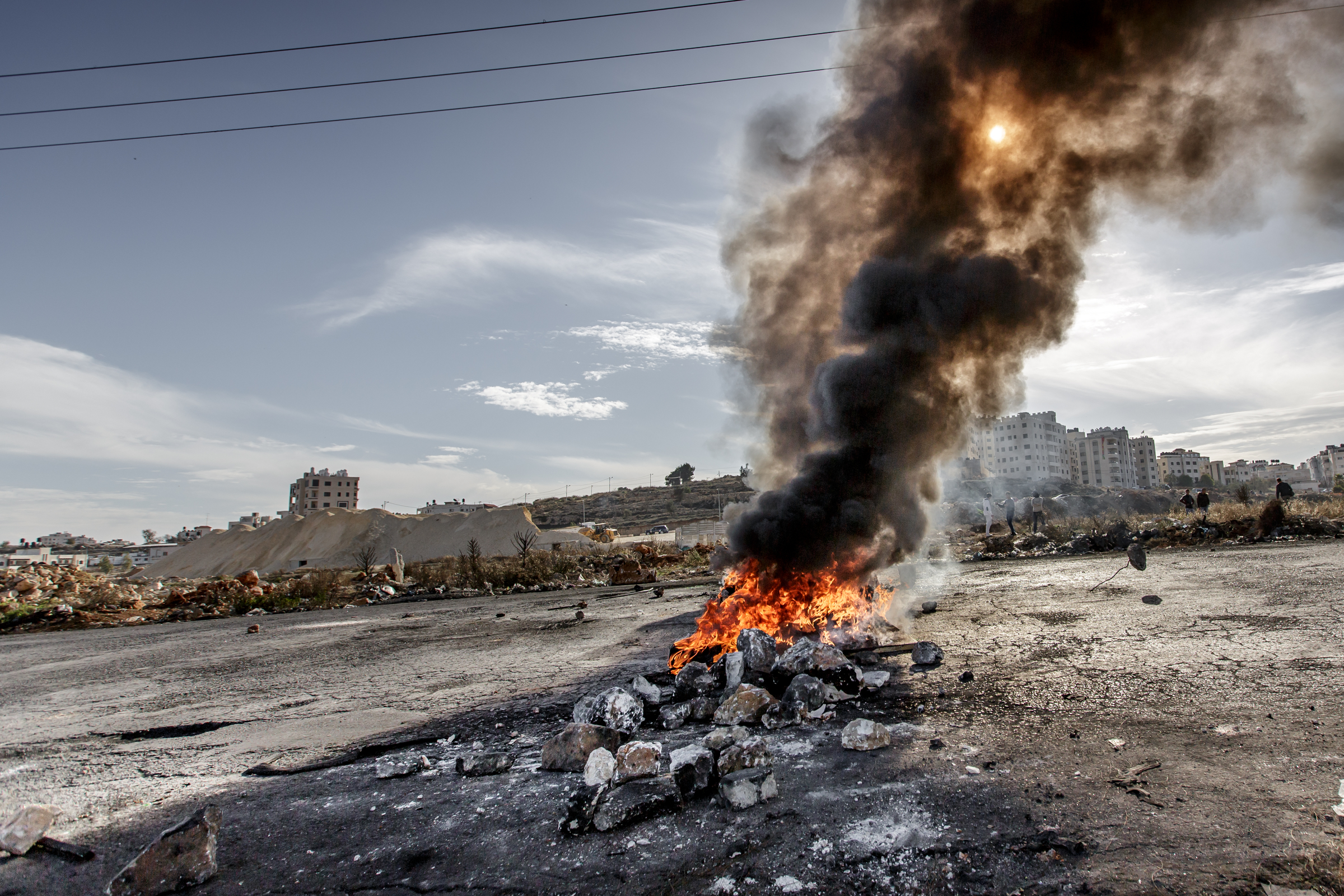
Devastation after Friday prayers: Palestinian youths and Israeli soldiers regularly clash in Ramallah.
The city is surrounded by three UNRWA-administered camps for displaced persons and almost 1,000 NGOs. © Klaus Petrus
Alliance Sud: Mrs Calmy-Rey, 20 years after the launch of the Geneva Initiative, the Middle East is witnessing the worst war since the State of Israel was created in 1948. How do you view Switzerland's role in this conflict?
The Geneva Initiative supported by Switzerland was an alternative peace plan signed between Palestinian and Israeli civil society aimed at a comprehensive settlement of the conflict and a two-State solution. In 2022, the Federal Department of Foreign Affairs (FDFA) withdrew its support for this Initiative while continuing to talk about a two-State solution. It must be said that over the past decade, the objective of a Palestinian state did become secondary on the international agenda. We have ignored a conflict deemed to have no solution and continued to engage in the rhetoric about a two-State solution, but Western countries have done nothing to bring it about. The best illustration of this is the weakening of the Palestinian Authority. The thinking was that normalising relations between Gulf States and Israel would lead to a resolution of the conflict, but this is clearly not the case. Today, the idea of a two-State solution has resurfaced, but its implementation remains problematic in the light of the lingering issues around the status of Jerusalem, settlements policy, and the right of return for refugees.
Times have also changed. Isn't the two-State solution even more difficult to implement today than 20 years ago?
Yes, you are right. Look at the trend in the numbers of Jewish settlers in the Occupied Palestinian Territories: in 1993 there were 280,000, today there are 700,000. The building of the separation wall has transformed the West Bank into entirely ungovernable micro-enclaves. More than 90 per cent of the land between the Mediterranean and Jordan is under direct Israeli control. For now, the two-State solution remains wishful thinking.
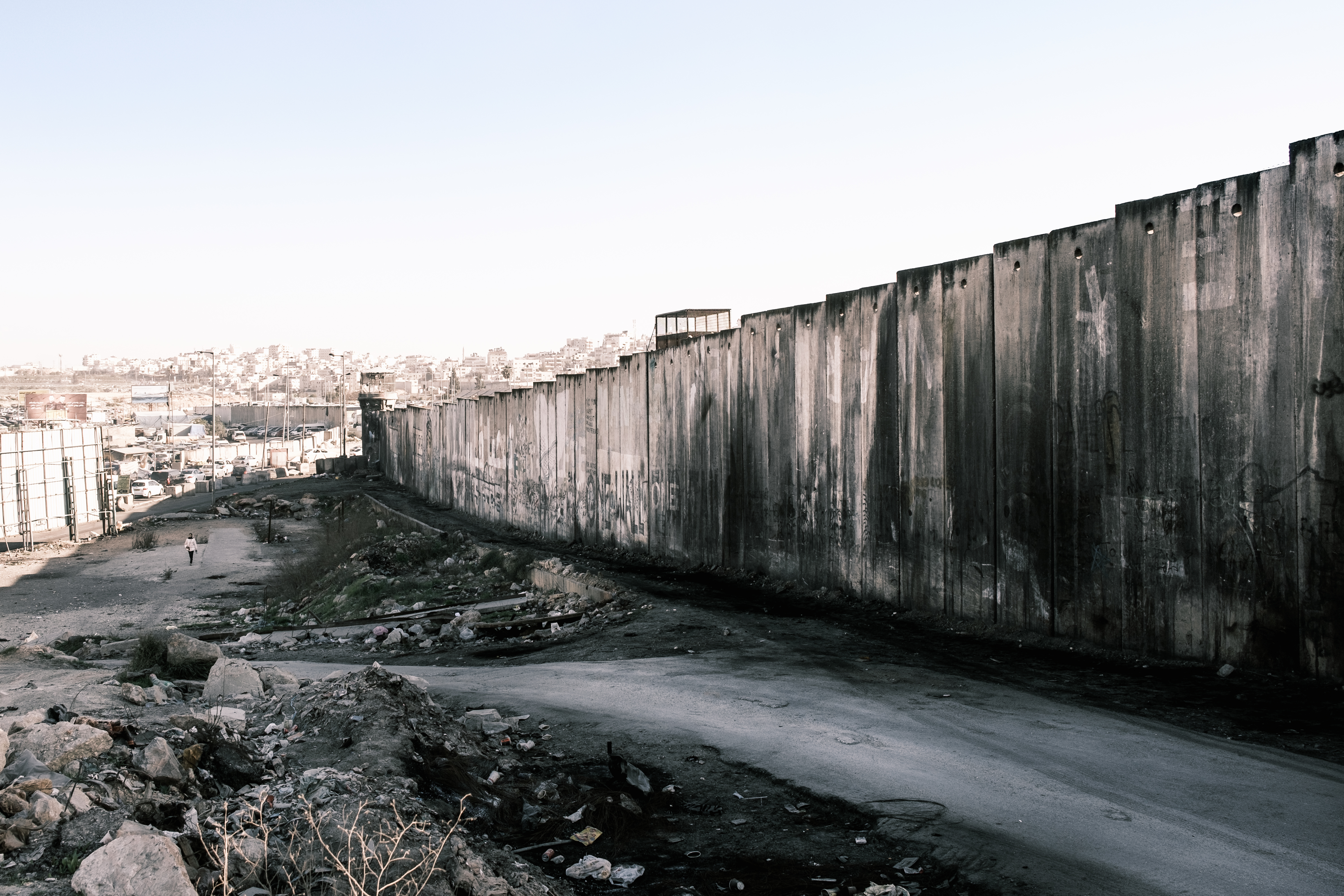
Qalandia checkpoint: At the end of the Second Intifada, a wall was built, seven metres high in places, which today separates the West Bank from Jerusalem and Israel. © Klaus Petrus
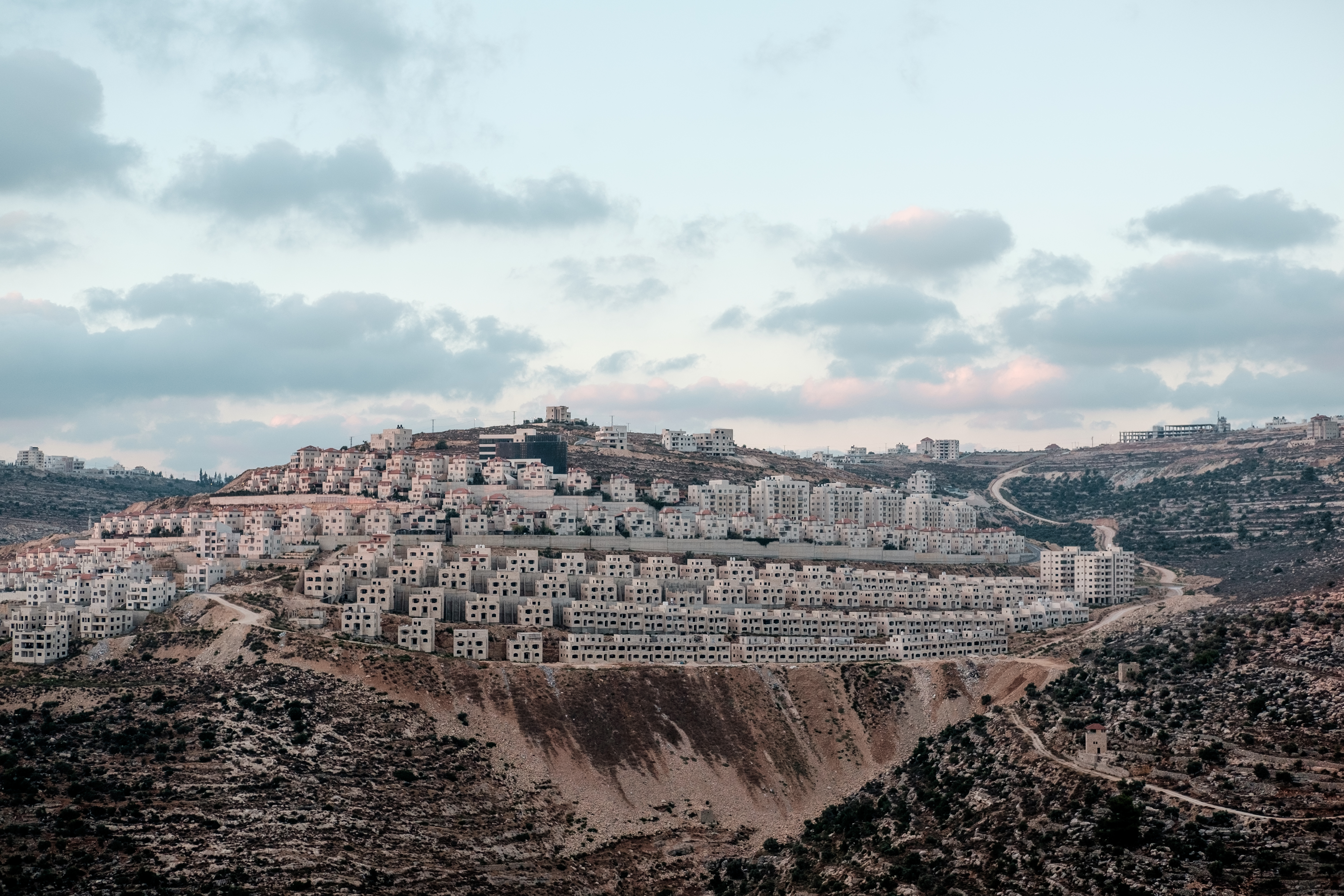
Construction of an Israeli settlement near Bet El, north-east of the Palestinian city of Ramallah. © Klaus Petrus
What do you think of Switzerland's cooperation in the region at present?
I’m finding it difficult to make out a clear Swiss position. Its message is confusing. In its official position, it called on the parties to fulfil their obligations under international law (IL) and international humanitarian law (IHL). Along with 120 other countries, Switzerland approved a General Assembly resolution calling for an immediate humanitarian truce. But this attitude has drawn criticism from some quarters. At the same time, the head of the FDFA announced Switzerland’s suspension of funding for 11 organisations in Palestine and Israel – thereby catering to the wishes of some political parties that are keen to see an examination of whether development aid to Palestine should be cancelled. In the end, only three Palestinian organisations are being affected by the suspension. Lastly, while Switzerland had initially decided not to cut the CHF 20 million paid annually by Bern to the UN Relief and Works Agency for Palestinian Refugees (UNRWA), it may well reassess its funding in the wake of the announcement of the immediate dismissal of 12 of its employees suspected of being linked to the attack on Israel on 7 October. Regrettably, there is a substantial risk that Switzerland's contribution could ultimately be suspended, despite the colossal humanitarian needs in Gaza.
I’m finding it difficult to make out
a clear Swiss position.
What do you think of Switzerland's announcement that it wants to organize a peace conference on Ukraine?
At the WEF in Davos, Switzerland stated that it would help organize a peace conference. Usually, preliminary talks are held, the aims of the meeting are determined, and a public announcement is then made. In Davos, Switzerland did it the other way round. The fact remains that the situation is different from that of a classic mediation between two States at war. The peace conference would take place after four meetings of security advisers from more than 80 countries, the last of which took place at Davos, and all of which were public. The method therefore had to be adapted. I am pleased that Switzerland is making moves and deploying its not insignificant strengths. At the moment, however, we can only speak of preliminary preparations.
What would happen next?
Russia is unlikely to participate directly in the first summit. At the same time, a peace conference without Russia is inconceivable. In Davos, our President and our Foreign Minister expressed their wish to involve Russia. They affirmed that Switzerland wanted to work with as many Heads of State as possible, especially with States that have so far tended to side with Russia. If instead of merely playing host, Switzerland wants to help shape the discussion, it will also have to determine the content, whence the importance of involving States close to Russia and Russia itself. Besides, it is unrealistic at this stage to expect agreement on most of the points of the Ukrainian peace plan. Switzerland should determine, in the abstract, the points on which there is promise of a common denominator between the friends of Ukraine and the defenders of Russia. There are also technical issues on which interim agreements could be reached in the interests of the parties, for example, on cereals, prisoner exchanges, the safety of nuclear power stations, and so on.
I would like Switzerland to be more outspoken and forthright regarding the observance of international humanitarian law.
You were instrumental in Switzerland's bid for membership of the UN Security Council. What do you think of its performance after a year?
Switzerland has been able to pursue its traditional foreign policy in the Security Council. After the earthquake in northern Syria, it worked with Brazil to facilitate humanitarian access. But the country finds itself on the Security Council at a time when multilateralism is in difficulty, being hampered by the vetoes of the major powers. I would have expected Switzerland to be somewhat more proactive in regard to the application of international humanitarian law. It's a pity that the country isn't doing more in this regard, as we cannot accept what is happening in Ukraine or in the Israeli-Palestinian conflict. No-one is observing the Geneva Conventions, as evidenced by indiscriminate bombing in Gaza, and acts perpetrated by Hamas on 7 October that constitute war crimes. It is unacceptable for so many Israeli civilians to be killed, for Palestinians to be trapped in Gaza by Hamas, and for aid deliveries to be impeded. I would like Switzerland to be more outspoken and forthright regarding the observance of international humanitarian law. After all, it was born in Geneva and Switzerland is the guarantor of the Geneva Conventions.

Western Wall or Wailing Wall in the Jewish Quarter of the Old City of Jerusalem with
Jewish believers and ultra-Orthodox. © Klaus Petrus
At the same time, multilateralism seems weakened... Do you still have confidence in UN institutions, and what role should Switzerland and international Geneva play?
The Security Council is being paralysed by vetoes from one side or another. But the technical agencies are concentrated in Geneva, and when the discussion turns to the erosion of multilateralism, we must also look at what is happening here. The Palais des Nations was closed for a fortnight to save on heating costs, the International Committee of the Red Cross (ICRC) will be laying off 4000 staff, and the Office of the United Nations High Commissioner for Refugees (UNHCR) is also set to shed a good many staffers. Geneva is home to an impressive number of technical UN agencies which, while facing problems, also possess the data required for the smooth running of globalisation. They handle mobile frequencies, patents and trademarks, public health, working conditions, the climate, and the coordination of humanitarian aid. The United Nations needs thoroughgoing reform, not only of the Security Council, but also to make its technical agencies more effective.
How do you view Switzerland's development cooperation? Do you think that the regular budget of the Swiss Agency for Development and Cooperation (SDC) should be used to fund the reconstruction of Ukraine?
From what I can see on the SDC website, it advocates political and economic autonomy for States. Switzerland's priority has been and still is to help the poorest people. In any case, I find it indefensible, from a foreign policy standpoint, to cut aid to the poorest countries – this being a regular budget item that is renewed from year to year and a sustainable SDC aim – and reallocate it for reconstruction in Ukraine. This is undoubtedly a highly desirable and necessary objective, but hopefully one that is limited in time and, as I see it, one that should benefit from special funding.
The Swiss people are finding it difficult to understand why arms are not being sent to Ukraine, but to Saudi Arabia, which is waging war in Yemen.
Does Swiss neutrality still apply today?
Switzerland currently pursues a policy of neutrality. It does not send weapons to belligerents, either directly or through intermediaries. Switzerland condemned Russia's aggression, as it contravened international law. It applies economic sanctions against Russia. Had it not followed up its condemnation with sanctions, it would have opened the way for European sanctions to be circumvented, thereby siding with the aggressor. Yet, the Swiss people are finding it difficult to understand why arms are not being sent to Ukraine, but to Saudi Arabia, which is waging war in Yemen. The war in Ukraine is not typical of our times. Today, armed conflicts between States are the exception. Civil strife is on the increase, as are cyberattacks. And what should we do when things become even more complex? The law of neutrality does not prohibit arms exports to Saudi Arabia, as the case of Yemen does not constitute an armed conflict between countries. The definition of war under the law of neutrality clearly poses a challenge of interpretation.
As Special Envoy of the OIF Secretary-General to monitor the situation in Madagascar, you recently headed an electoral observation mission to Antananarivo on behalf of the Francophonie. This year will see a record number of people going to the polls around the world. Is this a litmus test for democracy?
In Madagascar, the question confronting the community of like-minded countries (Switzerland, the EU, the USA and Western countries) was somewhat different. Madagascar is a gateway between Africa and China, and there is a Chinese and Russian presence on the island. The like-minded community observed the electoral process and formulated observations. It wanted a more inclusive, transparent and open electoral process but, for geopolitical reasons, agreed to finance a less-than-ideal process, and the outgoing president was re-elected. Madagascar is a very poor country and electoral processes cannot be measured by the yardstick that is used in Switzerland. Not all Madagascans have access to electricity, not all polling stations are connected, and means of communication are lacking.
The interview was conducted at the end of January 2024 and translated from French.
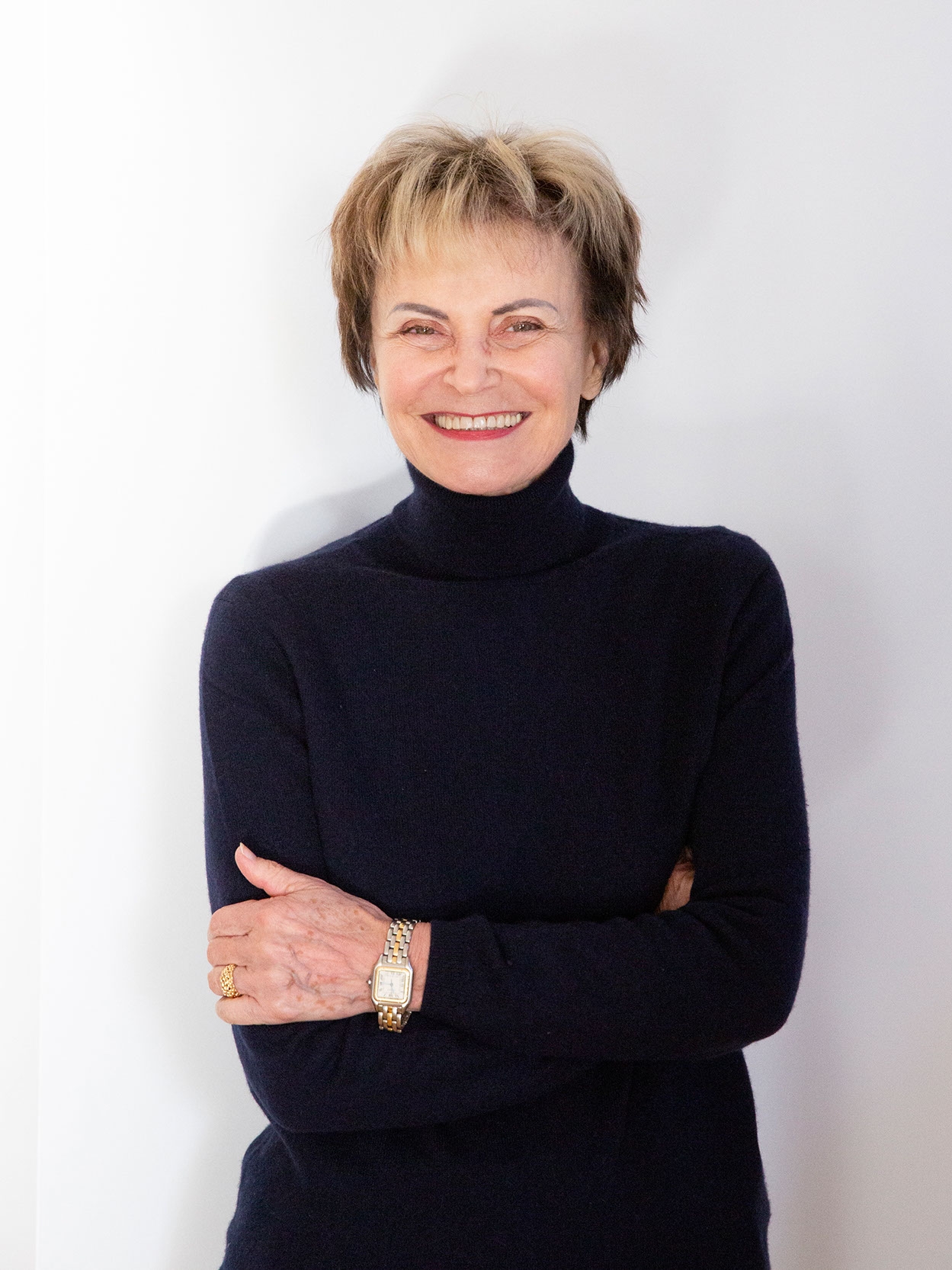
Micheline Calmy-Rey
Former Federal Councillor Micheline Calmy-Rey was Head of the Federal Department of Foreign Affairs (FDFA) from 2002 to 2011. She pursued a policy of active neutrality, thereby involving Switzerland in a number of international mediations and peace initiatives. The best known of them is the mediation between the Russian Federation and Georgia, which paved the way for Russia’s membership of the World Trade Organisation in 2011. Switzerland was also involved in mediations between Turkey and Armenia. In 2008, Micheline Calmy-Rey successfully negotiated the agreements on the representation of Georgia in Russia and of Russia in Georgia.
Share post now

global
The Alliance Sud magazine analyses and comments on Switzerland's foreign and development policies. "global" is published four times a year (in german and french) and can be subscribed to free of charge.